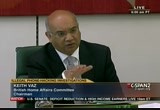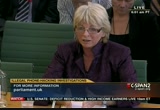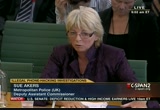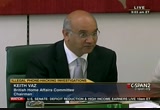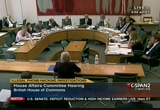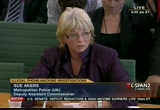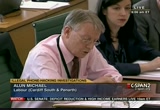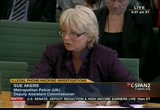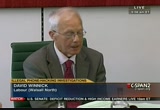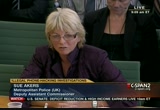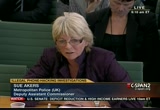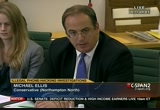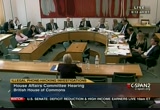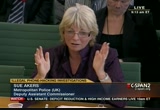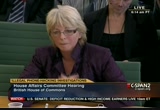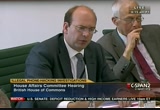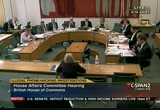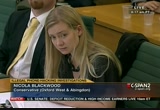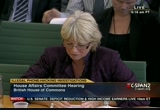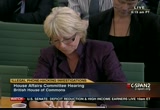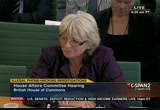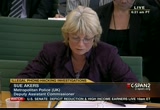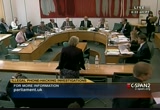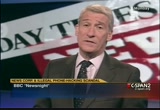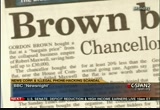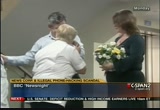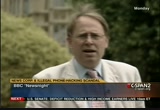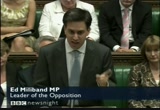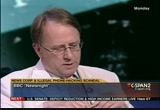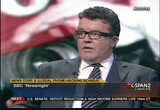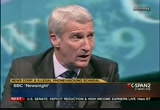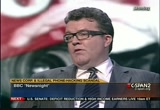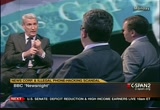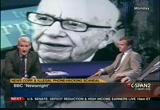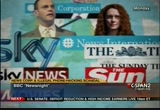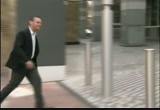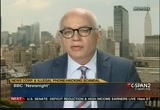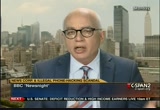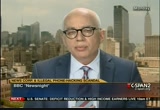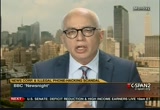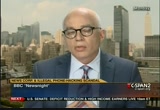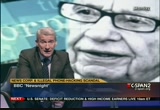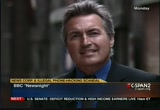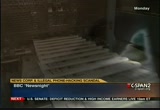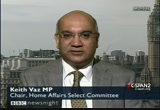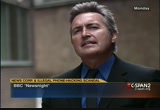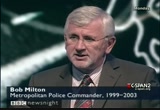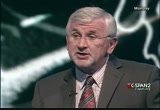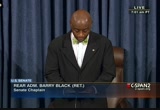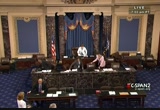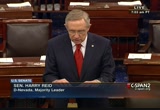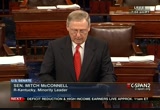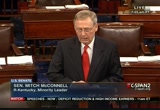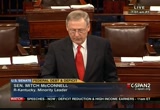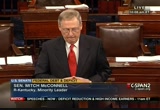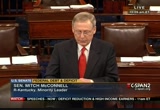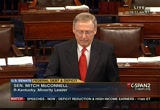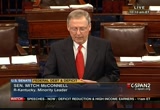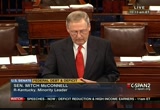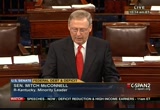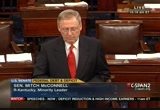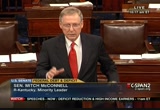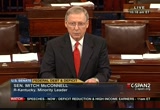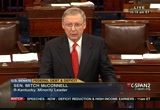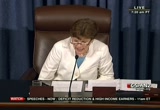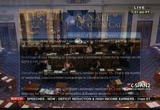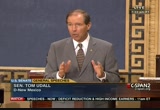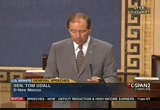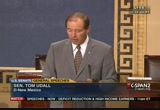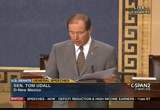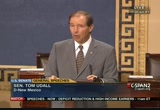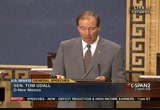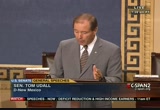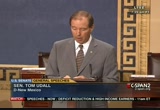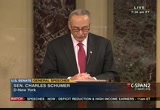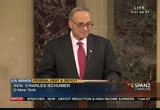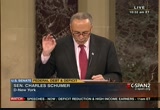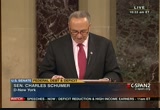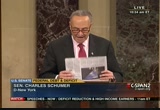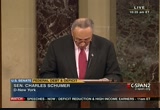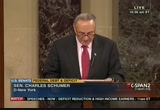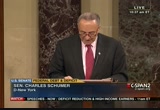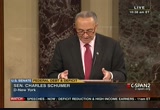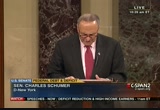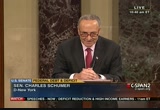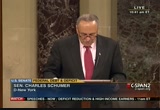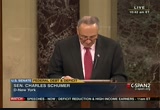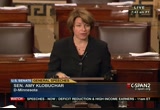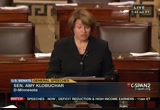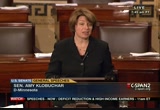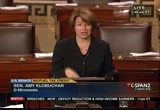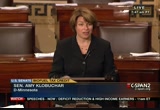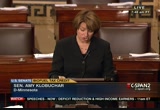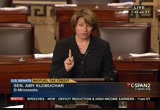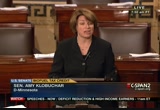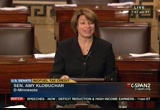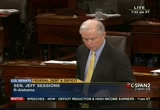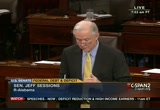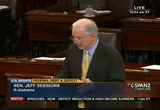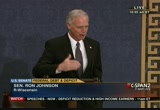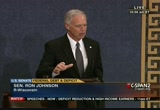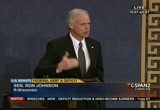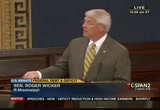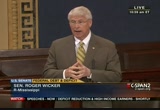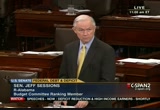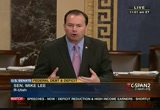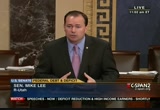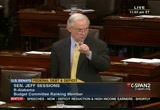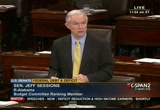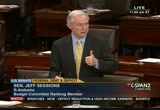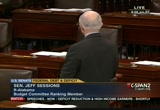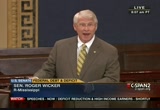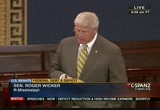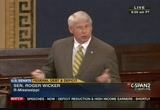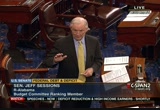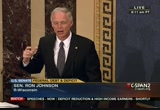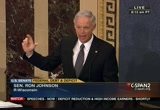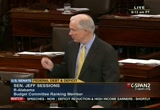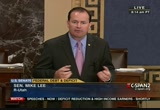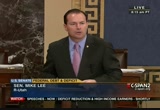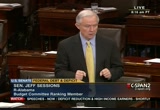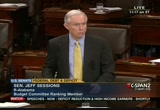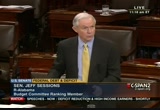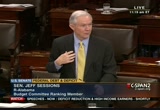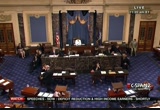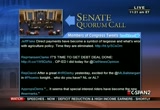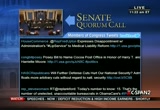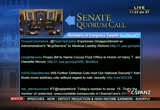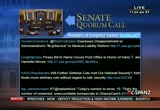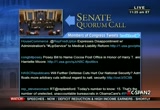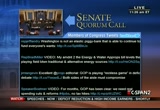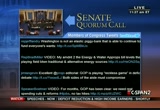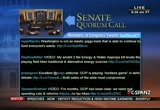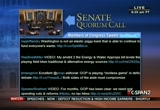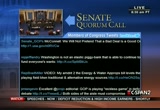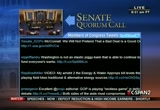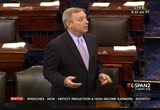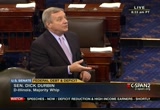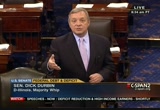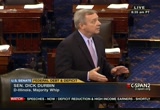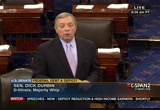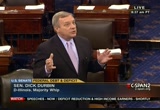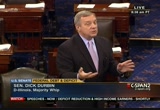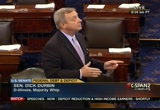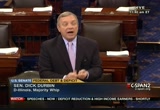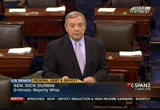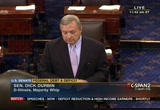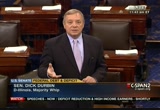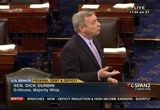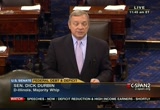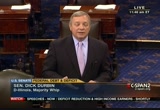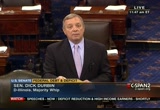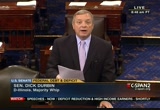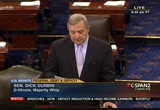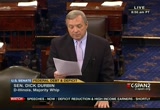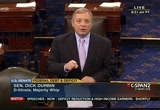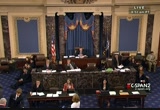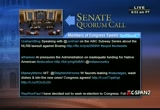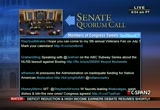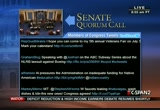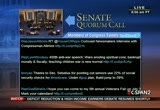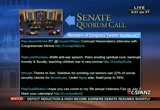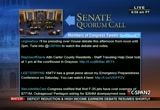tv U.S. Senate CSPAN July 12, 2011 9:00am-12:00pm EDT
9:00 am
contained within that material. there are nearly, i think, 4,000 names, first names and second names in the original documentation. we've undertaken, gone through each one of these people, and as we do that and we work our way through that, on the pages that they are shown, and we're showing them the material because they can help with our investigation because they can make sense of numbers and connections that we can't, as we show them that, there are a range then of other people or numbers. they, in turn, belong to people who we've also said we will go and see. >> what are the issues that are of concern -- thank you for that. from this committee, we had took evidence from the mobile phone companies. between them they had 120 victim on their books, and they were waiting for communication from metropolitan police as to what
9:01 am
9:02 am
department. but where we.net is ask. >> the names of been coming out into public domain, for example, former prime minister's' name was mentioned, also the fact that a number of royal protection officers may have indeed sold stories to journalists. is that under your purview as well? >> all the victims who are in the '05-'06 investigation and any subsequent petition of that will all be under my purview. >> mr. brown, for example, said he went to the police briefly to ask whether he had been hacked and nobody replied. when people think they are being hacked, they write to you, do they? do you say yes or no? >> they do. when we took over the job, our legal department still has quite a lot of lessons but there were still in the process of
9:03 am
answering where people had made that inquiry. and that was part of our prioritization exercise. we needed to get through and replied to people who had asked. and since all the huge coverage any media, and since journalists have the cold calling potential victims, now has its last weekend i think something in -- like five other people have written to us asking if they were speculative really, if they were contained in the material of those 500, i think 70, that have been contained in material. >> cannot clarify the issue of resources, because we're concerned when we heard from mr. clarke and others about the issue of resources. do you have all the resources you need in order to do this work? we have a commission to force last week and i asked them about the amount of resources going into this, and they prefer all these senior officers to try and
9:04 am
catch burglars and others i think he said. which other resources you need. you have no problem if you need more resources to get this matter resolved once and for all? >> i think i do. it is something i keep consulate under review, and i said earlier that i can get more resources if necessary, similarly if there looks like there's others and our investigation doesn't require it. i can return people to other duties. but it's constantly under review. but in an organization of 50,000 plus people, i can assure you that 45 people are on operation. >> the acoustics are not very good. [inaudible] police officers -- has been referred to the independent police complaints commission by the metropolitan commissioner,
9:05 am
as we understood it last week. so that they will decide how those allegation should be investigated. >> on the 20th of june, we were alerted to the fact that there were allegations of payments being made to police officers that would require investigations, some documentation was handed over by news international. early in the morning on the 22nd we had a meeting where further documentation was released. and as a consequence of that, i and a colleague at a meeting with the ipcc to tell them what we had. and it was agreed at this stage that we would continue to scope and that's what we did. there came a point i think on the seventh of july when commissioners talk about were made a formal referral to the
9:06 am
ipcc. and that now is under the personal supervision deputy chair, who is taking it as an investigation. that means the direction and control remains with me, but i keep place of what's happening. >> i fully understand the. as i understand it, if there is an allegation in the investigation of either illegal activity or improper behavior, it has to defer to the ipcc, and they can then decide that you continued with the investigation or otherwise. >> that's right. >> my question to you was can you confirm the referral had been made? >> yes. >> can i ask whether the other issues have been under consideration in relation to the
9:07 am
failures in the investigation, which have obviously been the subject of so many questions in this committee? >> that is further than my knowledge. [inaudible] >> thank you, mr. commissioner. one of the constraints would not jeopardize your investigation. how quickly do you think such an inquiry could really get going? >> i think it has to got going. i think you will see from the fact we have made it a rest already we -- >> not yours. [talking over each other] >> difficult to put a timescale on my investigation. i think there's probably a limited amount of work at the public inquiry could do whilst my investigation carry on.
9:08 am
i think where you get to difficult issues as we start to take evidence, that's where i was answering. >> do you think the delay would perhaps be on the order of weeks, months, years? >> i can tell you that of the arrest we have made, october, so certainly if you were to be any charges they would've happened before then. and then we go through the court process, so -- [inaudible] that won't interfere? >> suspend it, pending my investigation. >> exactly. david winnick. >> the responsibility lies on you, deputy assistant commissioner, to try to get to the bottom of this criminality. leaving aside the inquiry, mr. prime minister announced
9:09 am
last week. can i just get clear in my own mind in your reply to mr. michael, the previous inquiries, you will begin with that at all? >> i will begin with any conduct matters that arise out of that. i in dealing with material that was part of the previous inquiries. >> so you we looking at the previous inquiry, putting aside the -- >> the material that was used in the convictions of goodwin is the same material, plus additional material, we are using for our investigation. >> in effect, all the inquiries, investigations since the allegations were made. >> well-publicized, 11,000 pages contained in the material, yet. >> the last question i want to ask you is, what level of
9:10 am
support -- [inaudible] >> i think it's fair to say that when we started, and all our dealings were through lawyers, it was difficult. forgive me if i'm offending anybody in this room, but lawyers tend to make things, to me, seemed fairly uncomplicated. [inaudible] >> so we spend some two months, and you heard my colleagues talk about journalists privilege, privileged material and how that -- we develop protocol. i held a meeting at which for the first time, to use international executives attended, to debate our very
9:11 am
different interpretations of the expression for cooperation. and so subsequent to that meeting, i can see the relationships have been much better. we deal certainly weekly if not daily directly with the executives, and it is an altogether different feel. [inaudible] >> i think they are very senior indeed. their executives. >> names? >> i'm sure they wouldn't mind. [inaudible] >> thank you very much. >> i want to ask you, commissioner akers, about some of the scope of your investigation, if you can. been asked about the "news of the world" and the news international. is this the scope of your investigation just about that organization, or are other media
9:12 am
organizations? >> well, we have to start with a start. and i said, going to record as saying we will go where the evidence leads us. we started with the "news of the world," and that's where we are. >> so if -- >> going on to get i think encroaches on my investigation so i would rather not speculate. >> when do you expect to finish? >> it depends what we uncover along the way. >> for example, is our payments to police officers for leaking information, or journalist, will you investigate? >> i am investigating those matters. >> thank you. >> in the comment you made at the start you talked about leading to your investigation. i ask this as a genuine question, but how was a possible civil action can uncover information that the police are not able to do through criminal investigation? as a general principle. >> because as part, because part
9:13 am
of the action, they ask for disclosure, and the lawyers would approach, they are obliged to apply them with what they have asked for. i know what you are saying, but for five years it was civil actions. that's where it was. there are people out there who felt so badly about this that they continued to pursue their actions until finally the they t their day in court. as to say, perhaps an appropriate time, there have been a number of journalists and other campaigners that kept us on the agenda, and we've reached a point now where one might think they've achieved their objective, a public inquiry, i'll hear giving evidence to committees, and other things where they think they probably
9:14 am
got what they wanted. i am aware from the amount of reporting that goes on in the various papers that there must be people sitting on a lot of material, and i think the time is for me to say please, if you have got anything, evidence that would support my investigation, we are now six months down the line, and i would just ask if anybody is holding that, now would be a good time to put it on the table. >> honorary colleagues speakers i have been in touch with mr. watson but not mr. bryant's big and presenting your committee, "the guardian" or anyone else? >> anyone who is holding material, which clearly people are, from the amounts of media coverage, and there's been some species are you surprised any of these names that are coming out, or do know these names? for example, the gordon brown issue. >> now, i am aware of them. >> mark reckless.
9:15 am
[inaudible] holding material because of the stories coming out, is at least another theoretical possibility as stores are being sourced from within the metropolitan police? >> i'm sorry, i don't follow your. >> could it not be the opposite, whether paid or otherwise information, rather than necessary being the place that the media outlets already have it? [inaudible] >> well, we always, we will always be accused of that. i can say with absolute confidence, because i know what's been there. for instance, when there was speculation around victims of 77 bombings, we did not know that they were contained within our material. >> thank you for the answer that i wasn't accusing. >> is a natural thing for people. >> you did say that the reopening of that is being prompted by the disclosures of the civil action, but i recall i
9:16 am
think john needs telling us that it was reopened because the "news of the world" had given further evidence with which -- which of those? >> both. they gave further evidence because knowing they were going to have to disclose that evidence in civil actions, they presumably realized that would have to come to us. >> and can ask a question finally, why was it in 2009 when it became apparent that the "news of the world" was given a very substantial payoff to gordon taylor, why didn't that prompt the matter to reopen? >> i'm sorry, i can't answer that. i don't know. i haven't looked back. i'm focusing on going forward with my new inquiry, and i haven't analyzed. [inaudible]
9:17 am
one of the criminal laws. is a possible in an inquiry of this, that should also be looking at section 17? >> as to any charges, and we were, we have a very good relationship with the cps and we work with them and they will decide in due course if it comes to that, what the appropriate charges are. and i'm sure they won't confine themselves to one particular part of it. >> thank you. >> you mentioned that you can't remember an initial part of your investigation going to the evidence and summing a list of victims because it wasn't in an accessible for. but the evidence we just received from commissioner yates, on the 12th of july, 2009, he had put all the names of the documents that they had onto a searchable database. so was that not an easy format?
9:18 am
>> now, and i think that's a not issue. it was not complete. one of the decisions that i made when taking on this was, as laborious as it may become if we're going to apply people in going about whether they were victims, i had to be absolutely reassured that we had a complete and accurate picture. and so we have completely gone through the maternal again and put it on another database. >> the database assembly 2009 does not have a complete list of victims. >> it has some of the material. i haven't entered it all, yes. >> and you have not a complete list of all the victims from the pre-january document is also the post-january documents? >> we have now put on to a searchable database all that material that was seized in
9:19 am
'05-'06. >> and what about the recent disclosures? >> constantly being updated. >> how many have been contacted and how many are left to be contacted? >> when i started to describe the scale of the task we've got because i've made this commitment, i think i said there were, i think something like 3870 names, first and second names in the database. there are another 5000 landline telephone numbers about, and another 4000 mobile phone numbers. so, we've started, and again, we've had to prioritize the people are listed in as well as other high profile people we've seen. i think -- i've forgotten how many, bear with me.
9:20 am
sorry. he tells me 170 people have been informed. >> so as a 3008 and 70 names, i thousand land lines and 4000 moguls, 170 have been contacted? so there's a lot more work to be done. >> there's an awful lot more work to be done. i can see how that looks, and i will explain first of all, the mother took to -- >> we completely understand. >> we are distracted by civil actions and other things. >> we are not being critical at all. thank you. dr. huppert has the final question. >> can i talk to you about the
9:21 am
-- [inaudible] he identified a huge number of different publications which found a journalist using illegal services, the daily mail, the daily mirror. are you prepared to look beyond "news of the world" if that's where the evidence leads you? >> if i have evidence, absolutely. [inaudible] what damage has been done, how much damage has been done to the mat by all of this? >> i think it's everybody's analysis that confidence has been damaged. and i don't, and i don't doubt, if we don't get this right will continue to be damaged but i'm confident we've got an excellent team who are working tirelessly to get this right. and i hope that i don't have to
9:22 am
come back here in five years time to explain why we failed. >> and it is reported that the commission will be making a statement tomorrow. it's reported in regarding. i just received a letter from him concerning it is their intentions or plans to do so. do you know anything about this? >> can i say what we're fighting an awful lot of things from the press. we have no idea about. our inquiry, i think it's fair to say i haven't ever expect any great quite like this where -- [inaudible] some of which is completely speculative. >> you are confident that this will be a thorough inquiry and that it will help -- >> i guarantee it will be a thorough inquiry. >> we accept your guarantee. >> thank you very much. should we book is in five years time, i'm not sure. thank you very much for coming and apologies for keeping you waiting. order, order. session is over.
9:23 am
>> the u.s. senate gavels in at 10 eastern today, and about 40 minutes from now, to continue debate on a bill barging high income earners to contribute more to deficit reduction. >> now is the time to deal with these issues. if not now, when? >> the debt limit is the legal limit on borrowing by the federal government, and since 1962 has been raised 74 times, the last time in february 2010.
9:24 am
9:26 am
>> we just left the british house of commons committee hold a hearing looking into phone hacking by british news organization. we will see now how the bbc news night is covering this story. >> entire immune system going into violent reaction. sadly the policy want to spy upon them, find rupert murdoch. >> if i was running that company right now with all of the problems and difficulties and the mess frankly that there is, i think they should be focused on clearing this up rather than on the next corporate move. >> the affliction spreads as of the news international papers are accused of invading the privacy of gordon brown and his family. "newsnight" has new details of how mr. brown reacted when rebecca brooks broke the story of his son's illness. >> it's happened at the moment mr. murdoch was poised to take an even bigger role in british
9:27 am
life. and his ambitions. rumors swirling around news international this afternoon are to save, rupert murdoch might dump all of its u.k. newspapers. >> more accusations to the placement were corrupted in exchange for information. also tonight, enough air conditioning to play football in the desert. how did he touch with a smaller population than west yorkshire persuade fever to let and stage the world cup? >> attack on 2020 is because it fits the purchased the people of in the mind. arab nation could not have one. >> no one it seems was safe from the attention of corrupted journalists. there were allegations today that they even tried to hack the phones of members of the royal family. and reporters from the sun and
9:28 am
the sunday times flag details of gordon brown's bank account and have his son medical reports. david cameron, meanwhile, stood by his decision to appoint a federal editor of the "news of the world," as his communications director. there is no sign of the scandal diminishing anytime soon. first tonight michael crichton reports. >> today the hacking story moved on with new victims, gordon brown and his family. new charges against more murdoch newspapers, both the broadsheet and tabloid. and exposure of more unethical methods by members of the press. the brown revelations came from investigations by the bbc and "the guardian." the first relates to a flapped mr. brown bought. eight years later the sunday times ran a story suggesting it was bought for a knock down some. the bbc has received a tape of a
9:29 am
call to a firm of solicitors which seems to suggest how the details were obtained. >> i wonder if you can help me. my name is peter, i'm council, and we are looking in the course of acquiring property in london and i wonder if i can find out the price of the property when you sell the property at that time? >> the collar is known to have been working for the sunday times at that time. another charge is also from 2000, but someone rang the abby bradford six times at the details of mr. brown's account. the abbey wrote to mr. brown somewhat protected been. the letter was sent to sunday times, also. felt the abbey never got firm proof the paper was behind the call. but the worst charges concern gordon brown's son, fraser, who was born in 2006.
9:30 am
the browns think the sun's front-page story that fraser had cystic fibrosis came from access to the baby's medical records. >> these are extremely serious allegations. i think like many members of parliament, indeed many members of the public, you know, i'm shocked and horrified at these allegations that people could do this to gordon or his family. it needs to be looked at. >> tonight, gordon brown said his family was shocked by the scale of lawbreaking and intrusion into their private lives. he's expected to do an interview tomorrow. >> it all seemed to happen today in one extraordinary mad rush around 4:00. not long after those revelations about what may have happened to gordon brown and his family started trickling out over the internet, came extraordinary news from news corporation, that
9:31 am
they're withdrawing their undertakings about spinning off sky news. that only minutes before the secretary jeremy hunt was due to address in peace about the future of the news corporation did for sky. at the same time, david cameron was six miles away in canary wharf fielding questions from journalists. >> the pm sent a clear warning to the murdoch's, don't think of taking over the sky until you have cleaned up your act spent all i would say is this. if i was running that company, i would, all the problems and difficulties and the mess frankly that there is, i think they should be focused on clearing those up rather than on the next corporate move. that is the i would take if i was running that company spent back at the house it was ed miliband who wanted to grill. but the team past the issue to jeremy hunt. >> mr. secretary hud.
9:32 am
>> now hunt may have to cope with the dramatic news from the murdoch's. >> i understand in the last few minutes news corporation have withdrawn their undertakings in news. >> on january 25, on january 25 i said i was minded to refer news corporation's proposed merger with bskyb to the competition commission. in the absence of any specific undertaking. as a result of news corporation's announcement this afternoon, i am not going to refer this to the competition commission -- [shouting] will be rightly for them to pass. >> why wasn't cameron there to answer questions himself? labor wanted to know. >> mr. speaker, the prime minister was wrong not to come to the house of commons today. as on every occasion during this crisis, he has failed to show
9:33 am
the necessary leadership the country has faced. he saw no need for additional and cori. he saw no need to change course on track and he is failed to come clean on andy carson. this is, prime minister, running scared. >> some think rupert murdoch should just wait for the competition commission, but ditch the bskyb altogether. >> i know it's very unusual for people in the position of mr. murdoch to behave honorably and simply with decency, but he also recognize what's going on in his organization, why there is doubt about his integrity, and he ought to withdraw the bid for bskyb. just leave it. >> only three weeks ago, both cameron and miller band were happily drinking with rupert murdoch at his summer bash. the mood change so dramatically he would be hard-pressed now define any politician who would want to be seen there.
9:34 am
>> michael crick is here with us now. i gathered new information tonight speak was yes, we been talking to one of gordon brown senior colleagues from his days in downing street, who has told us how and 2006, the autumn of 2006 the office received a phone call, that somebody from the sun, the son had had a tipoff from an infirmary, someone inside the infirmary that fraser had cystic fibrosis. this was right in the middle of the preparations, pre-budget report with gordon brown and his colleagues. and apparently according to the source, gordon brown reacted very badly. how did they know come he asked? how could the reported? where is the public interest? he wasn't going to let them make a story out of his sons ill at the and apparently mr. brown was very concerned that this story should come out in a positive way, which not only which would be described as tragic or heartbreaking. and mr. brown wanted to issue a
9:35 am
statement to that effect to stop the sun from coming out with an exclusive story on this. whereupon rebecca brooks, the editor of the sun phoned gaming the bride, gordon brown's press spokesman and got quite hairy about this and so there's no justification for a preemptive state. this is not the way things were being done. she was frightened gordon brown would stop the sun exclusively. indy and the sun managed to get the story out by being interviewed on sky news and gordon brown did manage to issue a positive statement about the situation. >> thank you. labor in the tom watson, and george, former press secretary to david cameron. you are a very good friend of gordon brown. how significant is this story about his son?
9:36 am
>> i didn't know about it and tell i actually saw it today, but i wouldn't want that kind of thing about my children slapped all over the papers. i would be very upset if it came out, so it's yet another tragic story in this saga that isn't over. >> and yet, having had that done to him, he still went to rebekah brooks' wedding. >> yeah. a weird thing about politics your kind of on the treadmill, you've got to do these things. he's got responsibly, he's got to win election. he has a lot of people behind. i think you probably didn't want to go to the wedding but felt he had to. you will have to ask him why he went. >> this frankly tawdry relationship between -- this is not just in your party but all parties, and this particular media empire is being increasingly exposed? >> yeah. the good is already coming out of this. we've got to get the criminals in jail.
9:37 am
i think those days are over. i think the familiarity between these people is going to be reduced, you know. if you get -- if you ask for the prime minister's diary, if he goes downstairs it's published but if he has a meeting in the flat, it's considered a private meeting. those kind of silly little arrangements have got to stop. >> do you think this is a turning point? >> i think we've got a real problem. it's gone on for decades actually. and basically these swaggering editors and newspaper proprietors, i think it's been counterproductive. it's undermined journalism itself. and if what comes out of this is a proper revelatory framework where we actually have the kind of regulation, forecasting on the print press, i think it would be a good idea. >> you go right back to the property of the harlot. this is going on since
9:38 am
newspapers begin. >> yes and it's always been wrong. when david cameron first, we did make quite an attempt to change that. spent why did he hire and even? >> i was going to split it is a very concerned to tend not to play this game. to keep the media at arms length. 's. by hiring a tabloid editor? >> frankly what happened is in 2007 there was a ceiling, gordon brown would do everything to get headlines the next day. so there's a lot of occasion in that approach. that may have been wrong but all i'm saying is now -- >> it's an abandonment of what you said. a new policy. >> not totally abandoned the but basically, not put it at arms length. >> with hindsight's. with hindsight it was, but i think to be fair, both parties have had a problem. mr. campbell for the best part
9:39 am
of 10 years was telling tony blair we need to do something about it, and he was right. there was a period where there was a consensus on it that broke in 2007. but now from where we are is something good comes out of it will have proper regulation immediately. and once and for all we can put the profession of journalism into a much higher plane. >> everyone of course is incredibly biased at the time of embarrassment like this. let's try to engage some practical mechanisms for how this relationship which has been the dominant feature of what's come out today. this relationship between -- let's say all media empire, politicians should be reconstructed. >> rebuild it. >> no press? >> unique independent representation on the new body, indeed sanctions, volunteer so that when an editor even makes a mistake was guilty of a wrongdoing, they can oblige the paper to put it right.
9:40 am
i think you need for more transparency on behalf of government. these cozy little meetings and private sessions -- >> do think there should be a requirement that sunday should be made public? >> the meetings with -- >> yet, the proprietors. >> when the proprietor meets the prime minister at downing street is completely unacceptable. [inaudible] >> look, they make it around the rose but right now river murdoch can go in the back passes, have a meeting at 10 downing street and no one knows about it. that's remarkable. >> i think you've got to some a separate proprietors out from the editorial decisions. because in broadcasting you don't have some proprietary, even in the private copies, dictating what you should do. that's because you the proper code. if you break the code you have big finds. >> the other real tarnished after to come out of this so
9:41 am
far, and undoubtedly many, many more, are the police who are both incompetent and some of them corrupt. now, what should happen to assistant commissioner yates? >> john yates misled parliament, and he was tasked to review this 2006 evidence within the evidence was assigned that many phones have been hacked. and he came department and said there's -- i think his position is untenable. >> he should be sacked. >> he should resign with dignity. >> he certainly has questions to answer the fact that actually they have access to information, they're the only wanted it and it didn't take it. >> do you have confidence in john yates? >> no, i don't. >> do you think he should resign? >> i think his position is not good, frankly. >> thank you both very much. now, commercial conference in rupert murdoch is leaking like a sieve. shares in trying to drop the
9:42 am
candidate -- dropped. there have occasionally been some who are safe and decent. there outnumbered by the william randolph hearst and conrad black's. murdoch no claim to be something different. a newspaper man who happens to be, a multimedia tycoon, but he never surrendered his close personal control of his empire. as david reports, that's increasingly seen as part of the problem. >> rupert murdoch sits atop a complex british arms of his corporation. his son oversees the european and asian interests including news international, the country that owns the sunday times and "the sun" and until yesterday the "news of the world." james is also chairman of bskyb, of which news corp. owns 31%. they want to own it all. in an effort to save the deal in which they would get it all, they have sacrificed the "news
9:43 am
of the world." but has rupert murdoch left his home today, it was clear that this wasn't going to go anywhere near as waging the anger that was threatening to scrap the deal. the only and have been crawling all over the bskyb deal for months now is that news corp. had in effect an undertaking. they're going to spin off sky news outside their control, in effect limiting the amount of the british news media that they were in charge of. this afternoon, they withdrew that undertaking, triggering that competition commission investigation that they had been working so hard to avoid. why would they do that? well, the answer is given where they are now, given positions that they can see going forward, getting a competition commission investigation is about the best position they can hope to be an spent i think what they're doing is they're saying let's give it time, you know, whilst the
9:44 am
competition commission does their job, hopefully that will deal with questions as to whether or not news corp. is the proper -- which have been very much in the minds of everyone concerned. once this all dies down. commission has progressed and hopefully find in favor of the acquisition, then it will go ahead and slip under the radar with no one really complain all that much. >> that questioned whether executives are fit and proper people involved in broadcasting is another headache for the company. it is a question judged. happen to 2010 stewart was in charge of broadcast content and standards. >> if you were to decide today that the members of the bskyb board, not many of them have because one or two can do. but you're not fit and proper people. actually happened hold a bskyb license did a quick what's going to be done about the first piece, put aside the
9:45 am
acquisition. >> the american side of the murdoch empire might also prove problematic. now rank dow jones and "the wall street journal," up until 2007 in charge of news international. that is, the time the bribes were officially paid to british police office. even if he had no knowledge of these payments, news corp. could still hold foul of the u.s. foreign corrupt practices act. >> under u.s. law and entity can be found liable for a violation come if anyone within the business organizations acting within the scope of their employment makes payments intended to benefit at least in part the business organization. so there really are potential to cause of this investigation from your standpoint if it does pursue. the corporate level and perhaps, although we don't know at this point, as to any culpable individual. >> james murdoch somebody could be vulnerable, too.
9:46 am
he approved huge payments to the victims of hacking. >> you embarked on a sustained and deliver cover up, that's the accusation is made against you, because you know terribly was into didn't wanted to come out. >> there was was a particular settlement that i authorized, and i have said was made with information that was in -- incomplete, i acted on. executives and lawyers with incomplete investigation, and as a matter of real regret for me personally. >> the investigation definitely buys the murdoch's time, but to do what? the rumor swirling around the times newspaper this afternoon is that that title might be the subject of the murdoch's next drastic move. >> to the guys in new york, this appears to be in a bit of time warp. it's about the murdoch heritage. it's about the newspapers in britain rather than about the future of news corp. >> it could go spent i'm not
9:47 am
suggesting it happens today. i'm not suggesting five years time, but actually maybe if there's a post rupert murdoch moment, and who knows what that will be, when the guys in new york want to make a distant company. >> remember, that the only grounds of the competition commissioner going to judge the sky deal on its plurality. that is, its impact on the number of distinct voices in british news. if the murdoch empire gets rid of its british newspapers, well, the plurality problem goes away. >> now, michael is a contributing editor to "vanity fair," and knows rupert murdoch better than most having spent 50 hours interviewing him for a biography. he joins us now from new york. this talk that we are over on this side of the atlantic, that murdoch might just get rid of all his newspapers here in order to concentrate on television, doesn't make sense to use the? well, we hear it on the side of the atlantic, too. but i think what we're hearing
9:48 am
is the voice of panic. no windows what to do. i think every scenario is open for discussion. there's always been a faction within news corp. your this has why do we have these newspapers. newspapers, british newspapers no sense to us. we own a lot of businesses which are growing. that business is shrinking. so this becomes inside news corp. a political moment to say, hey, let's get rid of them. but i also think in a more general way, it's looking at this crisis and saying we are really in trouble. it's also looking and saying, how do we continue to run the news international? you know, so many of its executives are now utterly discredited. >> are you referring to members of his family? >> well, i'm referring to rebekah brooks. i'm referring to james murdoch,
9:49 am
the obviously has suffered an enormous loss of credibility. >> is part of the problem here the way in which rupert murdoch runs what is a public company as it were a private system? >> well, i think that is the question that is coming up in this country more and more, that this is an issue of governance. and that's a question that will have to go to the board. and we now have a situation, of course, where the murdoch's, people named murdoch are not accountable in conventional ways. and we have a situation in which people named murdoch are suffering a hemorrhage of credibility. you know, and i think that they are reasonably at the point where this hemorrhage has been so great that you have to ask, are these people who ought to be running a great public company. >> he's a pretty old man now. looked one years down the road.
9:50 am
is this going to be a company, do you think, controlled by a murdoch? >> you know, i would say, you know, a matter of months down the road this may not be a company controlled by someone named murdoch. >> you have any insight into why it is he is so protective of rebekah brooks? >> well, i do, and i think, i think it's a family issue, number one. and remember, the murdoch's see this as a family company. you do, the first issue is what's good for the family, and rebekah is very close to james. she's close to his daughter, elizabeth, her husband matthew freud. you know, i know that murdoch and rebekah themselves are very close. i mean, rebekah told me the
9:51 am
story once about she stopped smoking because, because murdoch challenged her in a swimming race. if he won, she would give up cigarettes. i mean, so we are talking about, about a really family intimate relationships. the other aspect of this is that, is that traditionally when someone in news corp. is attacked by people outside of news corp., they close rank. they never ever fire anybody. in new york, at the "new york post," they had to admit that the editor of page six, richard johnson, was taking bribes. literally taking bribes, being paid to write stories, richard works for news corporation. >> this is an entire newspaper shut down here. >> well, absolutely. i mean, they shut down a
9:52 am
newspaper so that in part the executives could keep their jobs. >> and now, do you hear about potential lawsuits their? >> well, there has been a shareholders lawsuit filed in delaware today, and i expect there will be, there will be more suits. of course, there will be. >> and what are they trying to claim? >> they are trying, trying to claim that there is a level of unfitness here. >> michael wolf, thank you. well, no one, neither the murdoch empire know the politicians, nor journalism more broadly emerging from this scandal is still a good. but the police it smells especially bad. the best they can get away with our accusations of being evil and incompetent. at worse our suspicions of corruption and accusations that individual officers were bought and sold.
9:53 am
scotland yard got testy today claiming people were trying to leak allegations that the "news of the world" tried to get phone numbers to members of the royal family by bribing police officer. richard watson now from the police. >> once again the ethics which should underpin the relationship between police and journalists is under scrutiny. as never before. when it works, cops need publicity to help them investigate. but a sort of allegations in recent days shows the darker side. >> any journalist work is sold -- sensitive information. that's what excludes them. but clearly there is a line that can't be crossed, and today's news as a member of the royal protection squad has allegedly passed on information for return for cash to come is yet another profound shock.
9:54 am
>> personal protection officers travel in the same car as the royals. close protection officers in backup vehicles. others guard buildings. the bbc was told today that the notion of the "news of the world" former royal editor asked his editor who went on to work for the p.m. for 1000 pounds to be paid to one royal protection officer. the police officer had installed a confidential directory containing phone numbers of the royals and those in the extended household. >> this is an unforgettable for protection officer who was trusted, entrusted by the principals themselves to protect them. and protection comes in a bright of different forms and protecting their personalities, their confidentiality is part of the key issue that iraqi protection officers should sign up to. >> but the story just so much worse. the e-mail suggesting these payments were made, discarded by their own internal investigation into thousand seven.
9:55 am
though they did not disclose them to the police and killed last month. the police have serious questions to answer about the failure of a previous investigation to uncover the truth. john yates carried out with the home affairs committee referred to as a review in 2009, but decided no further action was needed. but he says this so-called review was not a review at all. >> john yates said today you suggest i informed her committee that i've thoroughly reviewed all the evidence from 2006. this is not the case. i have never conducted a review of the original investigation. i was asked by the commission to establish the facts around the case. i have provided some considerable reassurance that let me to review this case neither need to be reopened or reviewed. >> i think it's a matter of semantics. wing is a review not a review, and when is the checking of facts a review? i think you will need to clarify
9:56 am
these questions with the john yates. john yates is a very experienced police officer who has held some of the most important jobs of the metropolitan police. i think we need to give him the benefit of the doubt before he appears before the committee and explains the difference between the two. >> he said there were very few victims. he said that all the victims have been contacted. he said that although mobilephone companies have been put on notice in relation to this. all of these things are lives. >> some have claimed senior police officers were too scared of being turned over themselves to tackle "news of the world." something that's always been denied. >> can we expect police officer to follow a ghetto moral code? if not, there will be embarrassing stories about the alleged affairs. but are these purely personal matters? what if it leaks the perception that some police officers are open to influence.
9:57 am
>> is a former assistant commissioner andy hayman who head of the first inquiry into thousand six into phone hacking. which didn't get far. he sent himself and headlines though of an alleged relationship. >> mark lewis wrote mr. haim had reason to fear that he was a target in the "news of the world." it became public knowledge that throughout the period of the investigation and into voice mail hacking mr. haim was involved in a controversial relationship with a woman who worked for the independent police complaints to mission. the same of course is also true of john yates who was involved in a controversial relationship. >> john yates said at the time these are disgraceful allegations made under parliamentary privilege. they are not too. mr. hayman didn't respond to our questions. >> police officers from other units were leaking information, too, in connection with its
9:58 am
diamond price, though it remains unconfirmed. even terror investigations -- >> they said open checkbooks and they were offering very, very good money. i can tell you it was six figures. >> 100,000 pounds plus with these sounds swirling around its logical to assume that other revelations will emerge. spent with us now is for metropolitan police commander who headed up the special protection squad and was in charge of national security vetting. let's deal with the royal question. are you surprised that officer was apparently willing to enter into negotiations to settle a private royal telephone books because i am absolutely devastated that the allegation has been made. royalty protection, the ip protection officers at the various highest level of integrity. for this to happen is a very, very bad day.
9:59 am
>> this was someone you vetted. >> i was in charge of a high level of vetting. and shoot a right that those officers working alongside the royal family would have been vetted at the very highest level, the same thing that anybody within the government or else has if they have access to confidential information. >> so what should be done? >> what should be done is a full open inquiry as to why did this happen. we don't know who this person was, was a principal protection officer, someone who sits next to the queen or was it somebody who stood outside buckingham palace who got hold of this book? we don't know. they have different levels of vetting. >> if this book is fresh in a widely available? >> i doubt it but anybody working within the environment of the royal protection may well have had access to it at some point. >> presumably they have had access. >> absolutely. but the point i'm making is here is the police officers are dated at different levels. so it may well have been not
10:00 am
somebody who has at the highest level of vetting. >> the senate is come in for more debate on a bill urging high income earners to contribute more to the deficit reduction. neighbors are scheduled to vote tomorrow on limiting debate and also on an amendment to the measure. and this afternoon congressional leaders returned to the white house at 3:45 eastern for another meeting with president obama on deficit reduction. we will give you reaction on the c-span network. meanwhile, live coverage of the senate here on c-span2. the presiding officer: the senate will come to order. the chaplain dr. barry black will lead the senate in prayer. the chaplain: let us pray. ever-present and ever-gracious god,
10:01 am
touch the hearts of our lawmakers today with the warmth of your love and the blessing of your wisdom. may they develop from the warmth of your love a civility and respect that will enable them to accomplish your will on earth. empower them to use the blessing of your wisdom to build a better nation and world. enlarge their powers with your strength by infusing their lives with the qualities of character which are needed in these challenging days. lord, help them to see
10:02 am
beyond the baffling and bewildering events of our times the unfolding of your loving providence, as they honor their office by striving to please you. we pray in your holy name. amen. the presiding officer: please join me in reciting the pledge of allegiance to the flag. i pledge allegiance to the flag of the united states of america, and to the republic for which it stands, one nation under god, indivisible, with liberty and justice for all. the presiding officer: the clerk will read a communication to the senate. the clerk: washington, d.c., july 12, 2011.
10:03 am
to the senate: under the provisions of rule 1, paragraph 3, of the standing rules of the senate, i hereby appoint the honorable jeanne shaheen, a senator from the state of new hampshire, to perform the duties of the chair. signed: daniel k. inouye, president pro tempore. mr. reid: madam president? the presiding officer: the majority leader. mr. reid: following any leader remarks, the senate will be in a period of morning business for one hour. the majority will control the first half, the republicans will control the final half. following that morning business, the senate will resume consideration of s. 1323, which is a bill to express the sense of the senate on the shared sacrifice in resolving the budget deficit. the filing deadline for all first-degree amendments to s. 1323 is noon today. the senate will recess from 12:30 until 2:15 today for weekly caucus meetings. as a reminder, all senators last night i filed cloture on s. 1323, which is the matter i just spoke about, and i also filed cloture on the motion to proceed to h.r. 2055 which is the
10:04 am
military construction, veterans affairs appropriations bill. as a result, there will be up to two roll call votes tomorrow morning. the republican leader can go forward. plp mcconnell: -- mr. mcconnell: madam president. the presiding officer: the republican leader. mr. mcconnell: for more than two years now, washington have stood in the believe that washington would never recover from the economic crisis that hit our nation two years ago as long as they had the mistaken belief that government had the cure. for most clear-eyed viewers, that view has found its clearest vindication. in the daily drumbeat of news about lost jobs, shuttered businesses, slumping home values, and in stories that each of us hears from our constituents about the economic hardships they continue to face. if anyone was still looking for proof that the president's
10:05 am
economic policies have been a failure, they don't have to look any further than the morning papers or the constituent mail. indeed, the more the administration insisted on spending and debt as a solution to our problems, the worse those problems became and the more americans demanded the status quo in washington had to change. but the administration was slow to get the message. after an election that any honest observer saw as a repudiation of its policies, the white house continued to cling to its playbook. as concerns about debt and deficit grew, the president presented a budget so unequal to the task that not a single democrat voted for it, not one. and as the nation irched closer closer -- inched closer to a potential default, the president focused his attention elsewhere. meanwhile, republicans were offering detailed solutions to the approaching crisis. we offered detailed budgets of
10:06 am
our own. we offered to work out a compromise that lowered the debt and protected entitlements from bankruptcy. and here's what we got in return. silence. and that's where the debate over the debt limit came in. if democrats would not agree on their own to do something about their addiction to spending and debt, then we refuse to enable it. if they wanted our votes to increase the debt limit, then they would have to do something to restrain the size and scope of government first. for a while there, there weren't many takers. democrats from the president on down insisted that we simply raise the debt ceiling and endorse the status quo on spending without any reforms. now, that changed a couple of months ago when the president agreed to delegate bipartisan debt reduction talks to the vice president. then a couple of weeks ago, the president broke his own silence on the debt ceiling and got
10:07 am
personally involved himself. incredibly, for those of us who had been calling for action on this issue day in and day out for about two years, the president tried to put the burden on us. with the nation edging closer to the debt limit deadline, the president retreated behind poll-tested rhetoric of class warfare. at a moment when we needed leadership the most, we got it the least. the financial security of the nation was being gambled on the president's wager that he could convince people our problems would be solved if we would all agree to take it out on the guy in the fancy house down the street. in my view, that was the saddest commentary on the status of leadership at the white house, and i'm proud of the fact that republicans refused to play along. we stood our ground. we know that what americans need right now is for the government to make job creation easier, not harder, and we said so.
10:08 am
at a time when 14 million americans are looking for work, we refuse to support a tax hike. we supported jobs and economic growth instead. when democrats saw that we wouldn't budge, they proposed one last offer to craft a deal. they asked us to join them in another washington effort to pull the wool over the eyes of the american people. they offered us the opportunity to participate in the kind of deliberate deception of the public that has given public service such a bad name in recent years. we also worked. the administration carefully leaked to the media without any details the idea that it was willing to go along with trillions of dollars of spending cuts. the lack of detail concealed the fact that the savings they were supposedly willing to support was at best smoke and mirrors. the hope here was that the budget gimmicks and deferred decisionmaking they actually
10:09 am
supported would have the appearance of serious belt tightening. but the practical effect would have been at most about a couple of billion dollars in cuts up front with empty promises of more to follow. we have seen this kind of thing before. it's just the kind of sleight of hand governing that's put our nation more than $14 trillion in debt. and i will not associate myself with it, and i refuse to join in an effort to fool the american people. republicans have told the president we're not interested in business as usual in washington, and we actually mean it. we will not be party to something that claims to save trillions but leaves it to future generations to pick up the tab and to future congresses to reverse it with a simple vote. we will not pretend that a bad deal is a good one, which brings me to a larger point. the suggestion has been made that this debate was hinged on the question of whether or not the two parties could find a
10:10 am
solution to our economic problems without raising taxes. wrong. we could have done that without breaking a sweat. the truth is the democrats saw this debate as a unique opportunity to impose the type of tax hikes they want so badly but couldn't even pass in a democratic-controlled senate last year. so let's not be fooled by false choice. this was not in the end a debate about whether taxes needed to be raised. it was a debate about the kind of government we want. this was a debate between those who believe that washington doesn't have enough money to spend and those like me to believe that washington has become too big, too expensive and too burdensome already. if you think that the federal government isn't big enough, then the only responsible thing to do is to support higher taxes. for those who are honest about that, i appreciate their candor. but for those of us who don't think the federal government should be in charge of banks,
10:11 am
the auto industry, the housing business, the student loan business, health care and regulating everything else under the sun, we're not about to further enable that model of government by shaking down the american people for more money at a time when they can least afford it. that's what this debate is about. it's about saying washington has gotten too big, and that it can't afford its commitments, that it needs to find a way to cut back on them. but don't demand that the american people pay more so washington can make its bad habits permanent. i read an article yesterday that said two of every five dollars americans spend right now comes from the federal government. is this really the model we want? madam president, i have a lot of meetings with constituents, and i'm not sure i have ever heard anyone say the problem with washington is they don't have enough money to spend.
10:12 am
i don't think i've ever heard that. it was my hope that the two parties could reach a meaningful bipartisan agreement, and i have to say i was initially encouraged by the prospect of the bipartisan discussions led by the vice president. although i disagree with him on most issues, vice president biden is a man i have come to respect as a straight-shooting negotiator. we found common ground last december to prevent a tax hike on the american people, and my hope was we could find a solution once again. sadly, these discussions started with a shared goal of reducing the debt but quickly regressed to a public side show in which the price of admission became an insistence that we raise taxes on job creators and on millions of american families who don't have yachts or corporate jets. at a time when jobs are few and
10:13 am
far between, that's not a price the american people can afford. so republicans searched in good faith for common ground, but the goal posts just kept moving. we trudged on, hoping the administration would at some point realize that the crisis we faced demand a clear change in direction, a departure from the government-driven policies of the past two years. but our hopes for a grand bargain eventually ran into a bitter reality that this administration is just not interested in a meaningful and lasting solution to our mounting debt. it is simply too committed to big government. we showed a willingness to sacrifice all along even as we made it crystal clear from the outset that tax increases would not be a part of any agreement. it was their commitment to big government that stood in the way of a grand bargain. it was their determination to freeze the policies of the last two years in place permanently.
10:14 am
the american people don't want that. and republicans won't be seduced into enabling it. an ideological commitment to big government has outweighed the white house commitment to find a meaningful compromise that does not damage our fragile economy in the process. rather than find a way to bring government back to the people, the administration has committed itself to protecting the size and scope of government at the cost of job creation, economic growth and america's status in the global economy. the tragedy in all this is that we all know what's necessary to solve the economic crisis we face. the answer is to cut spending. the answer is to cut spending. it's no secret how to solve the entitlement crisis either. any one of the people involved in these discussions could write it out on the back of an envelope, but it's also no
10:15 am
secret that democrats would rather demagogue any solution republicans oppose in next year's election than join us in seriously reforming them, despite what some democrats started to say once it became clear that republicans wouldn't agree to a plan that raises taxes. we all saw the news stories yesterday about how senior democrats have been worried about how reforming medicare now would make it harder for them to campaign against republicans later. evidently, they'd rather save their own jobs than save their programs from insol have en sivment i truly believe we can get this done. i truly believe, perhaps naively, that this administration would see the necessary necessity of preserving medicare and medicaid for future generations.
10:16 am
in the end, it appears that the perceived electoral success of demagoguing a solution proved its undoing. or perhaps it was just the id logical commitment to preserving the size of government by the most stridently liberal members of the other side. whatever the reasons, madam president -- whatever the reasons -- it's a tragic missed opportunity for the country. i hope the economists are wrong and that our economy will continue to grow over the next year and a half to buy us time to tackle the problems we face. but after years of discussions and months of negotiations, i have little question that as long as this president is in the oval office, a real solution is probably unattainable. this was not an easy decision for me. for my first day as republican
10:17 am
leader in the senate, i called on presidents from both parties to work with congress on real solutions to the problems that we face. and for more than two years i've had conversations with the administration about working together to accomplish something big for the country. on each occasion, i've been met initially with encrnlg words that gradually give way to moving the goalpost. in the end, they've always express add fundamental unwillingness to engage in a meaningful effort to reduce spending as a means to rein in the debt. despite our stagnant economy and the dire warnings of economic and security experts that we cannot sustain our mounting debt or unfunded liabilities, this president has provedden that he will do almost anything to protect the size and the scope of washington, d.c.,'s burgeo
10:18 am
burgeoning bureaucracy, including to threaten the economic security of every american by backing us up to the edge of default. now, i've heard some on the other side of the aisle suggest that republicans have put us in this position by refusing to accept what they call a balanced approach. my response is that if the american people have learned one thing over the past few years, it's that they need to bring their decoding rings to any debate in washington these days. when democrats say "investment," they mean government spending many h. when they say "revenue," they mean higher taxes. and when they say "shared sacrifice," they mean they want you to take the hit, not washington. it starts with the so-called rich, with the owners of the corporate jets, but pretty soon it hits the family flying in coach. eventually, everyone gets fleeced. well, americans have had enough.
10:19 am
they think it's time washington shares in the sacrifice. republicans invited democrats into these discussions about finding a solution to our problems and while we approach them with clear and unwavering principles, we also brought an open mind. the record reflects that. i won't betray the confidence of those who are willing to negotiate with us, but there can be no question by anyone involved in these discussions that republicans were willing to make tough choitio choices. so where do we go from here? well, i was one of those who had long hoped we could do something big for the country. but in my view the president has presented us with three choices: smoke and mirrors, tax hikes, or default. republicans choose none of the above. i had hoped to do good, but i refuse to do harm. so republicans will choose a path that actually reflects the
10:20 am
will of the people, which is to do the responsible thing and ensure that the government doesn't default on its obligations. and to continue to press the administration to rein in washington not to freeze it in place. that's why i will continue to urge the president to rein in our deficits and debt in a way that puts the short- and long-term health of our economy ahead of his personal vision of government. that's what the american people want. that's what republicans will continue to insist on. nothing less will solve the crisis we face. nothing less will do. madam president, i yield the floor. the presiding officer: under the previous order, the leadership time is reserved. under the previous order, there will be a period of morning business for one hour with the time equally divided and controlled between the two leaders or their designees and
10:21 am
10:22 am
mr. udall: madam president? the presiding officer: the senator from new mexico. mr. udall: madam president, i would ask that the quorum call be dispensed with. the presiding officer: without objection. mr. udall: thank you, madam president. i rise today as our nation honors the bravery and sacrifice of santa fe native lee row arthur petrie, an army ranger who in 2008 risked his life to save his fellow soldiers on the battlefields of afghanistan. today sergeant first class petrie will be honored for his conspicuous gallantry with our nation's highest military decoration: the medal of honor.
10:23 am
i will be humbled to be at the white house along with sergeant first class petrie's family, friends, and fellow soldiers, as president obama honors him with the congressional medal of honor. it will be a special day for sergeant first class petrie, for his wife, his children, and his -- and all his family and for his fellow americans. as he becomes only the second living active duty service member to receive the medal of honor for actions in iring or afghanistan. -- in iraq or afghanistan. sergeant first class petrie's story is one of courage and sacrifice and immense love of country. it's a story that began years ago in santa fe with a young plan who struggled in high school but refused to give up and instead buckled down, dug deep, and found the hero within. a hero to the men he saved on
10:24 am
that fateful day in afghanistan and a hero to all americans who owe their freedoms to our brave men and women in uniform. it's the story that day in may of 2008 that i'd like to tell you about today. sergeant first class petrie was a member of the 75th ranger religious when he and -- regimen when he and his fellow soldiers were to capture. they were engaged in a fire fight when several in their regimen were pinned down by grenades. petrie had already been wounded by bullet fishings shot through both legs by a hidden enemy. but he didn't a how his wounds to stop him. pinned inside a courtyard with a fellow ranger, he continued the fight calling in support and creating a brief pause in enemy fire by throwing a grenade their way.
10:25 am
one enemy grenade exploded within ten under the previous ya group of rangers. the explosion knocked the rangers down and wounded two members of the team. soon after the fishes grenade explode, the insurgents thraw second. this time it landed near two of his comrades. with no thought to his personal safety, he grabbed the grenade and attempted to toss it away. the grenade exploded as he tossed it, taking petrie's hand with it, but saving the lives of those near him. now losing a hand off with been -- would have been any of to break most people but not sergeant first class petrie. instead, he calmly inexpected his wound, stemmed the flow of flood with a tourniquet and continued the fight. helping to pin down the insurgents until they could be killed. it was in immense act of bravery that saved the lives of his
10:26 am
brothers in arms. in fact one of his fellow rangers, sergeant yell higgins wrote in a statement about that day, "if not for staff sergeant petrie's actions, we would have been seriously wounded or killed." on that fateful day in 2008, then-staff sergeant petrie was no stranger to service to this country. he was on his eighth deployment. let me repeat that eighth deployment in support of u.s. operations overseas, his sixth in afghanistan and after two tours in iraq. sergeant first class petrie's life of heroic service was based on humble beginnings. in 1998 a sphoar in the santa fe new mexican newspaper featured a then-18-year-old petrie. the young man was a senior at saint katherine indian school,
10:27 am
the institution's final graduating class. he was also a recipient of the bootstrap award, which honored area high school seniors who had committed to improving themselves and their community. here's what the teacher who nominated -- nominated him wrote: "with a record of fight, suspensions, and ditching school, petrie realized that he was on a path that led nowhere. he tried harder in school and appreciated h. how it felt to make his parents proud. from a path to nowhere to a path to history as a national hero, sergeant first class petrie is an inspiration for all young people who are struggling to find their place in the world. to young people who may be considering giving up and taking a more destructive path, he is a model. three years after his heroic actions on the battlefield,
10:28 am
sergeant first class petrie continues to give back to his country and his fellow soldiers as a liaison officer for the u.s. special operations care coalition in washington state, sergeant first class petrie provides a helping hand and much-needed resources to wounded soldiers, ill and injured service members, and their families." here's what le leroy's father sd of his son in a recent interview. "he's really overwhelmed by this. he keeps saying, dad, i was just doing my job. any other soldier would have done it." i think we'll all agree with what his father said in return. "well, son, you did something great and they really want to honor you for that." despite all the attention and recognition brought by this award, petrie beings, like some
10:29 am
of those brave warriors before him, remains humble. a recent posting on his facebook faith reads, "the award is bigger than a person, and i will always remember that." new mexico has a long and proud tradition of military service, exemplified in the heroic actions of sergeant first class leroy petrie on the battlefields of afghanistan. to sergeant first class petrie's wife ashley and their four children, to his mother and father and siblings and extended family, i know i speak for the people of new mexico and all of america when i offer the thanks of a grateful nation. you sacrifice your time, your loved ones, -- you sacrificed your time with your loved one so he could bravely serve our country. along with sergeant first class petrie, you are all heroes in
10:30 am
our eyes. sergeant first class petrie is highly deserving of this honor and new mexico is honored to call him a native son. thank you, madam president, and i yield the floor. the presiding officer: the senator from new york. mr. schumer: let me thank the gentleman from new mexico, the senator from new mexico for his heartfelt remarks. i know how much he cares about his constituents and our country, and we, too, at the opposite end of the country thank our soldiers for their sacrifice and then our families for those who make the highest sacrifice to our nation. now, madam president, i rise to speak about a subject that's foremost on my mind and the mind of my democratic colleagues here today, and that is the danger of defaulting on our debt. in the entire history of this great country, we have never
10:31 am
once defaulted on our debt. america has always kept her promises. but an alarming number of my colleagues on the other side of the aisle seem content to reverse that proud record. time after time. they have rejected sensible compromises to avert default. last year, all of the house republicans voted against the simpson-bowles commission. then a key republican walked away from the gang of six. then leader cantor abandoned the biden-led talks. and most recently, speaker boehner balked at president obama's grand style offer because of pressure from so many in his party. it's an obvious and unsettling trend. in each of these instances, the republican retreat was precipitated by one thing and one thing only.
10:32 am
an ideological quest to ensure that tax breaks for the richest few are protected. they have insisted we can't raise a single dollar from millionaires and billionaires, no matter how wasteful the tax break or how generous the subsidy. instead, they would rather balance the budget on the back of middle-class families. they think giving money, tax breaks to seniors -- to millionaires and billionaires creates jobs. what about all of those dollars that sit there in vaults and bank accounts? and isn't it true that taking away money from middle-class people hurts the job efforts? it's a one-sided ideological quest to help the most privileged few among us. now, this morning, "the hill"
10:33 am
newspaper reported that majority leader cantor made a proposal at the white house yesterday that outlined $353 billion in health care cuts. among the cuts listed by leader cantor were approximately approximately $250 billion in reductions in medicare. according to the hill -- quote -- "several of his proposals would raise costs for medicare and medicaid beneficiaries, protect the wealthiest among us, the millionaires and billionaires, and hurt the average middle-class senior citizen. this is the tradeoff leader cantor and the republicans wish to make. protect millionaires and cut medicare benefits instead. this approach is not balanced, it's not fair, it's not moral, and it will not be accepted. the proposal by leader cantor is very troubling, with you we --
10:34 am
but we can't ignore it because according to press reports this morning, leader cantor is now the leader of these negotiations for the republicans. it was reported he did the plurality if not the majority of the talking on the republican side at the meeting yesterday. well, leader cantor will need to approach this set of negotiations better than he did the last one. during the biden-led talks, leader cantor bolted the room as soon as it was time to make tough decisions he didn't like. let me read the front page of "the washington post" this morning. this is "the washington post" story, not my words. "cantor thinks the way to win this haggling session, one of washington's most important in years, is by walking out of it." let me repeat that, again from the "washington post" front page." cantor thinks the way to win
10:35 am
this haggling session, one of washington's most important in years, is by walking out of it." leader cantor cannot repeat that maneuver again this time. we are too close to the debt limit deadline, and there is no margin forever. madam president, this is crunch time. the clock is ticking. if we don't reach an agreement in the next few weeks, we risk roilg the financial -- roiling the financial markets and our nation's fragile economy will suffer a serious setback. middle-class families will see their mortgage rates and credit card rates go up. even a technical default, the failure to pay interest on our debt for just a few days, will in all likelihood cause g.d.p. to contract and jobs to be lost. it doesn't just affect the government. it's not just something far
10:36 am
away. it affects every family who has a mortgage, a variable rate mortgage or credit card debt. that's why it's time for my g.o.p. colleagues to jettison their ideological blinders and get down to pragmatic problem solving that will allow us to avoid default in its aftermath. we have had debt ceiling renewals on our desks for decades, and no one has ever played brinkmanship like this. no one has ever said our nation will not live up to its obligations, this great nation which always has from the days of the founding fathers and alexander hamilton. on this side of the aisle, we're working in good faith to reach a deal. over the past few months, we have worked diligently to identify more than a trillion -- that's a trillion with a t -- dollars in spending cuts, many of which are just as painful to
10:37 am
our caucus as taking away tax breaks to millionaires are to the caucus on the other side. it can't be just one way. we have put these difficult cuts on the table, because on this side of the aisle we recognize that our deficit is unprecedented and that bold comprehensive action needs to be taken in. and let me say this. an agreement, a budget agreement cannot be considered bold or comprehensive unless it asks millionaires, billionaires and wealthy corporations to contribute to deficit reduction. they don't have to do the whole thing, but they have got to do their share. that's why we want to repeal tax breaks that serve no purpose whatsoever other than to bloat our budget deficit. we want to make sure that at this time of fiscal restraint, there is shared sacrifice. now, let's face it.
10:38 am
madam president, middle-class americans and working class americans depend on government programs the way the wealthy do not. if you're a millionaire or billionaire, you don't need pell grants to send your kid to college. you don't need to go to a community health clinic to have your teeth examined when they ache. you don't need the high cost of prescription drugs to be a barrier. you don't have the high cost of prescription drugs to be a barrier to you and you don't need help to pay them. if we're going to scale back vital spending programs which go right to the core of middle-class, hard-working american families, we must also scale back special interest tax breaks that benefit only the wealthiest few like tax breaks for yachters and corporate jet owners. now, i want to make something
10:39 am
clear. i have nothing against those who made a lot of money. i think that's great. i think that's america. i know lots of people like that. most of the ones i know say yes, i should pay my fair share, but somehow there is a small group who seem to feel that they shouldn't pay almost any taxes. and those people are running the show on the other side of the aisle. if we're going to bequeath the american dream to future generations, if we're going to ensure that the american dream continues to burn brightly in the american breast, then we need to institute some shared sacrifice. and you know, madam president, in normal times, this would be a could consensus, middle of the road position. it's a position ronald reagan took. it's a position george h.w. bush took. as david brooks and other commonsense republicans have
10:40 am
noted, republican presidents and leaders have long supported coupling increased revenue with spending cuts to reduce deficits, but today's g.o.p. is unfortunately and sadly been dragged so far to the right by its ideological fringe that they now reject this balanced approach out of hand. they would sooner end medicare as we know it than ask millionaires and billionaires to pay a little more in taxes. that's the nub of it. they would sooner end medicare as we know it than ask millionaires and billionaires to pay a little more in taxes. how many americans agree with that? and certainly our political system for all its faults, at the end of the day, there is truth at the bottom of it, and this position will not help my colleagues on the other side of the aisle. when either party moves too far to the extreme, republicans too far to the right, democrats too
10:41 am
far to the left, they ultimately lose. that's what's happening to the grand old party in this chamber. more than 40 republicans, unfortunately, 40 in the house have vowed to vote against any increase in debt limit no matter how much deficit reduction accompanies it. i am not aware of a single democrat who has drawn such a draconian, dangerous line in the sand. remember, i say to those 40, it's not future spending you're voting against. you're voting against paying your bills, paying your debt. every american family has to do it. every american worker has to do it. to say the government shouldn't do it is unprecedented. so i urge my colleagues on the other side of the aisle to -- i
10:42 am
ask unanimous consent for two additional minutes. the presiding officer: without objection. mr. schumer: it's time for republican leaders to do some much-needed soul searching. are they willing to risk an economic cataclysm just to mollify an extreme wing of their party and score political points against the president? do they want us to be remembered in the history books as the first generation of americans to renege on our obligations? or will they put country before party, come to the bargaining table and forge a bipartisan path forward? like most americans, i'm a natural optimist. sure, i don't have much evidence to base my optimism on when republicans walk out on negotiations time after time after time when they don't get their way, but i nevertheless possess an innate belief that at the end of the day, we'll do what's best for our country and our economy. we'll raise the debt limit, pass a far-reaching deficit reduction package that includes both spending cuts and repeal of tax
10:43 am
breaks for the richest few among us, as the president recently put it, and he was whether intentionally or not, quoting a great thinker from ancient babylon -- if not now, when? let us hope we arrive in agreement soon. time, madam president, unfortunately, is not on our side. i yield the floor and the balance -- i yield back the balance of my time. a senator: madam president. the presiding officer: the senator from minnesota. ms. klobuchar: madam president, i want to thank the senator from new york for his important remarks. i'm here today to talk about the recent compromise that -- bipartisan compromise that we reached on biofuels. i have come to the senate floor a number of times to talk about this country's biofuels policy, and in the last month i have worked on a bipartisan basis with senator feinstein of california and senator thune of south dakota to develop a
10:44 am
compromise agreement that represents a good-faith effort to improve energy policy under very difficult economic times. at a time of bitter budget debates and entrenched positions, we worked together to find common ground and we took a step in the right direction, and that is a step of reducing the debt immediately by $1.3 billion of the $2 billion remaining on a subsidy. may i add, this was a subsidy that this congress voted for just in january of this year. so the biofuels industry understands that this subsidy was going to end at the end of this year, but they didn't just let it writtal away toward the end of the year, knowing there was waning support for it. they actually came to the table and said let's see if we can do something smart here that's good for energy policy and good for this country's fiscal position. under this deal, the volumetric ethanol act, the excise tax
10:45 am
credit will expire at the end of this month instead of the end of 2011. i have continued to say that this debate is not about whether we end this tax credit. it's about how we do it, and this compromise agreement represents a responsible and cost-effective approach. first, the compromise dedicates $1.3 billion, or two-thirds of the remaining ethanol subsidy to savings toward the deficit. it actually just goes right into the coffers of the government to reduce the debt. at a time when our country is struggling with increasing debt and partisan bickering, the compromise represents a step forward, so two-thirds of the money goes towards the debt. what happens to the rest of the third of the money? well, normally it would be going into that tax credit, $400 million every month for the rest of this year. instead, we take that existing $668 million, the other third, and use it to extend and expand the support for the production of cellulosic biofuels. as you know, madam chair, coming
10:46 am
from new hampshire, we have a lot of cellulosic biofuels in the midwest, but it is something you can see all over the country. it is a commitment to a new generation of fuel, algae, biofuels, switchgrass, you name it. there is a lot of possibilities here when you look at what could be the next generation of cellulosic ethanol. many of the first advanced biofuel plants are expected to be retrofitted onto existing corn-based ethanol facilities. this compromise also extends a small producer tax credit for one year at a reduced rate. this tax credit benefits smaller plants which were some of the earliest pioneers in the industry and offer structured as farmer co-ops. again, this is not new money. the money sending you understa n as of july 31 for the tax ked. it simply takes a third of the existing money and used it in a smart way so that congress won't
10:47 am
have to spend any new money on very important areas like cellulosic biofuels. this extension helps provide small ethanol plants a glide path to adjust to the elimination of the volumetric ethanol excise tax credit. last, the compromise invests in the infrastructure we need to bring greater competition in the fuel market. this means extending tax credits, the existing money, to help gas stations install a variety of fuel dispensing technologies, including ethanol, hydrogen, natural gas, and electric charging stations. so let me again repeat, this isn't just about biofuels. it's about all kinds of alternative energy that compete with oil. we should encourage our homegrown fuels to compete with foreign oil and this investment will help do just that and give consumers a real choice at the pump. i've always believed we should be investing in the farmers and the workers of our country instead of the oil cartels in the mideastern countries. the ethanol industry should be
10:48 am
commended in coming to the table to offer up over $1 billion in savings during these difficult budget discussions, and i believe -- and this i think is the most significant for some of the discussion senator schumer was having, that we've all been having about the debt, this compromise, while it may be a $1 billion instead of $1 trillion, but it is an example of what we can do if we are really serious about reducing our debt. it is a model for what can happen with government subsidies going forward. take, for example, the oil industry. traditional ethanol is a maturing market providing only about 10% of americans' fuel supply, 10% of the fuel supply. we're now at the point where we're actually macing more biofuels than we import oil from saudi arabia. that's pretty significant. but we're still only 10% with biofuels. how about oil? well, the rest is oism the oil industry has been a mature industry and collected subsidies for nearly 100 years. americans have shouldered these
10:49 am
costs for too long. the oil companies no longer need those tax breaks and we can't afford them when we look at the debt we're facing. the list of the oil production tax deductions includes one costing $18.2 billion over ten yearser, the expensing of intangible drilling, the percentage depletion afterllowance costing $11.2 billion over ten years, and the dual capacity rule for foreign tax credits costing $10.8 billion to taxpayers over ten years. the question isn't about whether the oil companies deserve the profits. it is a question about whether the american people should pay the cost of providing preferential tax treatment to the five largest oil companies in the united states which have racked up over almost $1 trillion in profits in jukes just the past decade. so that's the issue.
10:50 am
we're dealing with this debt. when we're dealing with the debt where middle-class families are paying multiple amounts every single year, multiple dollars into interest on our debt, should they also be asked to foot the bill to pay for these subsidies for oil companies when these oil companies are making almost $1 trillion in profits in the past decade? that's the issue. it is a question about whether the mature oil industry should continue to receive billions in subsidies at a time when their profits are up 30% in the first quarter of 2011. i'm not against drilling at all. i'm pleased about what's going on in north dakota right to our west. but when i look at what's happening with this debt right now, we have to be smart about this and this is clearly one place to look for savings. it is a question about whether a hugery profitable industry should continue to enjoy lucrative tax advantages at a time when our nation can least afford it. with oil prices much higher than actual costs, the oil industry
10:51 am
doesn't need extra money from the government. we must get serious about tackling the deficit and putting our country back on sound fiscal grown. but the problem we're facing now is not only a crisis of dollars and cents. it is also a crisis of the divide and the deadlock. it is time we open that deadlock. we did it with biofuels. we came tabored a compromise, with senator feinstein, who has spent her lifetime in the senate fighting against ethanol and senator thune and i came together on a bipartisan basis and got it done. we did it, immediately two-thirds of their immediate subsidy going to debt reduction. we know this deficit isn't going to fix itself. we all know that. the presiding officer: the senator's time has expired. ms. klobuchar: if i could ask for one more minute. the presiding officer: without objection. ms. klobuchar: thank you. we all know this debt isn't just going to go away. we all know we can't just close other highs and click our heels and wish our debts away. in that report, the national commission on fiscal
10:52 am
responsibility wrote that every modest sacrifice we refuse to make today only forces far greater sacrifices of hope and opportunity upon the next generation. and they're right. a relatively small industry like ethanol is willing to put two-thirds of its tax breaks on the dabble for deficit reduction immediately. the much large ears and much more profitable oil industry can certainly afford to do the same, if not more. thank you, madam president. a yield th i yield the floor. the presiding officer: the senator from alabama. mr. sessions: i would ask unanimous consent to enter into a colloquy with my republican colleagues. the presiding officer: without objection. mr. sessions: madam president, i thank senator klobuchar. she is a valuable member of this senate, and she mentioned some savings or additional revenue from tax increases and some were $10 billion, one was $8 billion, i think, one was $3 bsm i would just say that over ten years
10:53 am
that's how much those changes would raise. i would just recall for all my colleagues that we unwisely year before last, i guess it was, spent $847 billion on a stimulus package that produced little income and we're paying in interest on that of about $27 billion, $30 billion a year. it adds up as the years go by. iwe've now gone i think 805 days -- 804 days without a budget in this body. during that time, this country has spent $7.3 trillion -- that's $7,300,000,000,000. we have paid in interest on the money we borrowed $439 billion just this that period of time that we haven't had a budget,
10:54 am
interest on our debt is $439 billion in 804 days. and we've accumulated during this time an additional $3.2 trillion in debt, $3,20 $3,200,000,000,000 in debt. and during the past two years under the superdemocratic majority here in the senate and in the house, 60 democratic senators and the president's leadership, discretionary non-defense spending went up 24%. and the president proposes in his budget next year to increase the education department, the state department, the energy department, the transportation department -- double-digit increases again when this year 40 cents of every dollar we spend is borrowed. so i am glad my colleagues can be with me now and really would
10:55 am
ask -- i see senator johnson, a member of the budget committee. we had more people want to get on the budget committee this year, the new senators that were recently elected. senator johnson was one of the few to be selected. many were not able to get on the committee. and they hope to make a difference and to confront the problems that we face. senator johnson, you're a successful businessman. you just joined the senate last year. how have you felt to date about the process? mr. johnson: well, senator sessions, you know, i appreciate the kind words. my background is in accounting. and i have been in business for 34 years and i produced budgets for people on time, i've had people produce budgets for me on dime. and i look at the process -- orb the lack after process here at absurd. if you think about it i certainly produced budgets for smaller businesses, let's say a $10 billion company would go through an awful lot of detail
10:56 am
to drop a budget. when you talk about a little bit larger business, maybe a $1 billion business. then you come here to washington and you see business as usual here and i want to make sure the american people understand how absurd this process is. the fact that we haven't passed a budget in the senate in over two years and now we have the president -- at least he's finally got engaged last week. and they're meeting behind closed doors and is it really true that they're going to produce a budget over the course of a couple meetings, a budget for the federal government that would be $3.7 trillion, $3,700,000,000,000 worth, and they're going to do this behind closed doors, just a couple people? i mean, that is an absurd process. the fact of the matter is i am glad the president finally acknowledged that medicare is
10:57 am
unsustainable. that's a sad fact. i wish it weren't soavment but the first step of course in any process of getting -- of being healed is to acknowledge you have a problem. so i'm glad the president finally acknowledged that medicare is unsustainable. but if he was rulely serious -- but if he was really serious about structural reform, if he was really coming to the table in good faith, senator sessions, he would have come to the table six months asmg he would have been signature down in good faith with -- he would have been sitting down in good faith with republican members of congress who understand how urgent the problem is, who want to work with this president, who want to work with anyone who is willing to seriously address the fact that we're bankrupting this nation. so again i find this process absurd and i am just asking the american people to please think about what's happening here. rather than an orderly process, rather than a process in the light of day, we're doing it behind closed doors and there's going to be something dropped
10:58 am
i'm afraid in our laps with no time to review it. another one of these bills that nobody can have time to read and that is what the financial fate of america rests on? i don't think so. it should not be that way. mr. wicker: i wonder if my friend would yield? mr. johnson: absolutely. mr. wicker: of course the process is important. and it is designed for the president and the congress to work together to solve these problems. i think the process may be broken, which i think points up why we really, bottom line, need a constitutional amendment to require the president to submit a balanced budget. and to require this congress to enact a balanced budget. you know, the president submitted a budget to us. deficits as far as the eye could see. the budget, we brought it to a vote under sort of an interesting procedure here.
10:59 am
didn't get one single vote, not one republican, not one democrat would vote for president obama's budget. we hear rumblings that the chairman of the senate -- the democratic chairman of the senate budget committee may be actually about to bring a budget forward. it's been 800 days. we passed the 800-day mark last week. the budget chairman in the budget committee and the process has failed to work, to actually bring a budget out to the floor back from -- out from behind closed doors, as my friend from wisconsin has said. and let us vote on all of these procedures. so i would simply say, the president's budget was a nonstarter. i think, if the senate democratic version ever were to
11:00 am
be devised and brought to the floor, it would be a nonstarter, which is why we haven't seen such a proposal in 800 days. bottom line: republicans are united on this side in resisting tax increases on our economy at a time when we are at 9.2% unemployment and we're united, all 47 of us, in saying we need the basic change in the process in this country. of enacting a balanced budget amendment, sending that amendment out to the states for ratification. that would be the type of process reform that i think the american people agree that we need. mr. sessions: madam president, i ask my colleagues, senator lee from utah who just joined us. his late father was solicitor general of the united states law
11:01 am
school dean. we're glad that senator lee has really put a lot of effort in drafting a constitutional amendment, the good lawyer that he is, that would make a difference, i think, for our country. senator lee, maybe you would share your thoughts about your observation as a new senator on how things are going and why you believe a constitutional amendment, as senator wicker from mississippi has just said, would be helpful for our country and help put us on a sound path for the future. mr. lee: madam president, the need has never been greater for us to avoid gimmicks. gimmickry in this context can have very high stakes and can prove most detrimental to our economy and to the ability of our government to function. we have to look out for those gimmicks that would say we're going to make a few cuts now but most of the cuts we're going to propose in return for our ability to raise the debt limit will involve sacrifices by future congresses.
11:02 am
not the 112th congress. we'll just make a few, but we'll say that the 113th and 114th and successive congresses after that will make the difficult, necessary sacrifices. we can't do that. nothing allows us to bind a future congress. that's why we need something that's gimmick free. that's why we need to amend our law of laws, the u.s. constitution, to place important meaningful permanent restrictions on the ability of congress to engage in perpetual, reckless deficit spending, of the sort that is produced in national debt, now fast approaching $15 trillion. to a degree that is escalating now at a rate of success of of $1.5 trillion every single year. in order to change the problem, we have to change the root causes. we have to change the ability of congress to exercise its authority that it has so severely abused in recent decades under clause 2 of article 1 section 8 to engage in
11:03 am
deficit spending. a balanced budget amendment, the balanced budget amendment that's been endorsed and embraced and cosponsored by all 47 republicans in the senate will do just that. we have got a growing number of republicans, a couple dozen who have now gotten behind the one proposal that would allow us to approach the debt limit with this in mind and would require the balanced budget amendment to be part of that, and i urge my colleagues to support that. mr. sessions: i -- i thank you, senator lee, for your leadership and hard work on that. it's not an easy thing to draft something that people would all agree with, but you have all -- i think all republican have signed onto that, you and your colleagues, and we are happy for that, and i believe that this is not an impossible dream. when i came to the senate in 1997, we had a vote on the balanced budget amendment. it fell one vote short. we got 66, it required 67. how much better off would we
11:04 am
have been today? how much debt would we have placed on our children and grandchildren had that amendment been passed then? so i do think it's time for a national discussion again on this issue and to make that change and would like to point out something about the debt that we now have. unemployment rate came in disappointingly with only 18,000 jobs created last month in june. we look to have 150,000 just to stay level. unemployment went up. economic growth in the first quarter was expected to be much higher than it came in. it came in, i think the first number was 1.8. maybe it's been revised to 2%. the rogoff-reinhart study that studied debt defaults in countries all over the world for eight centuries, a highly respected study.
11:05 am
secretary geithner, the treasury secretary, said it's an excellent study and in some ways it underestimates the risk. this study says that when your debt reaches 90% of the economy, 90% of the gross domestic product, it pulls down economic growth by 1% to 2%. we are now at 95% debt to g.d.p. we'll be at 100% of debt to g.d.p. by the end of this year. i believe that our growth could have been 3% instead of 2% first quarter. i believe -- and 1% growth, according to the obama white house, christine roemer, economic advisor, amounts to a million jobs created. so i believe we have lost a million jobs that could have been created, we have lost additional tax revenue and growth and prosperity that would
11:06 am
help us deal with our debt because of the debt. you see, you can't keep borrowing. maybe when our debt to g.d.p. was 30%, maybe that's what it was when senator wicker probably came to congress. now we're at 100%. our debt is as large as the entire productivity of our economy, and economists tell us it's pulling down our growth and it's costing jobs and americans are not working today because of debt, and what we hear is don't worry about it, deficits really don't matter. senator wicker, you have been here in the house and in the senate. have you seen the situation in which our financial crisis, short term and long-term systemically is more severe than it is today? mr. wicker: well, i guess i got to the house in 1995, my friend
11:07 am
from alabama came to the senate two years later. i don't think we could have imagined an annual deficit of of $1.5 trillion in one short year. we are at -- we are spending that much more than we're taking in. in other words, we spent -- we take in $2.2 trillion a year, approximately, and we spend spend $3.7 trillion a year, a difference of $1.5 trillion. i don't think we ever expected it to get that -- that serious when the senator from alabama and i first got here. and clearly, there is no way we can turn back the clock, but the senator is correct. if we had enacted just one more vote in this very body a
11:08 am
constitutional amendment to balance the budget, clearly we would not be facing this fiscal crisis. i want to also make a very important point, and it's what all the papers are talking about, and that's whether somehow a tax increase targeted to deficit reduction is the thing to do. listen, my friends. republicans and democrats over time until recently have been united in saying tax increases are a bad thing to do. and i want to ask my colleagues if any of you can help identify the public official who said this quote. -- quote -- "the last thing you want to do is to raise taxes in the middle of a recession because that would take more demand out of the economy and put businesses in a further hole." unquote. now, would any of my colleagues
11:09 am
care to guess? senator lee? mr. lee: that was president obama in the middle of 2009 who made that comment. mr. wicker: absolutely. somehow, the president -- who made a very cogent and correct statement in 2009 -- has completely changed his tune now. we could have a budget deal in place on the floor of the house and senate and ready to be passed if the president of the united states would simply come back to the position that he took in 2009 and 2010, as late as december of 2010, the president was telling the "new york daily news" that we should keep the tax rates in place. the budget chairman and the senate told reuters last july, only a year ago, that he supported extending the tax cuts
11:10 am
and keeping them in place because to raise taxes on the private sector during a time of economic downturn is taking money out of the private sector and killing their ability to create jobs. so i would simply call on my colleagues from the other side of the aisle to return to the position that they had a year ago and two years ago. let's get a budget deal that addresses the debt by cutting spending and be united as we were on that issue some year and two years ago. mr. sessions: senator johnson, you're -- you are, as i recognized, a businessman. president clinton recently said we need to reduce our corporate tax rate. i was on a tv show with senator bill nelson, my good democratic
11:11 am
colleague, who said we ought to reduce some of these tax expenditures some call them, the kind of things that senator klobuchar, i think, mentioned. my understanding was that we could use that to help get our rates down so we are more competitive worldwide and create more jobs. now, i guess my question to you is if you take the -- if you simplify the tax code, you eliminate gimmicks, should the money be applied as president clinton suggested to reducing our rates so we are more competitive or should they be used to subsidize more spending by washington? mr. johnson: well, obviously, it makes more sense to actually use them to make us more competitive so the global capital actually flows to the united states to create jobs here. i am a long-term job producer. i certainly recognize it is the private sector that creates long-term self-sustaining jobs. i'm afraid that's what our colleagues on the other side of
11:12 am
the aisle and president obama simply doesn't understand. i'm often asked are you surprised by anything in washington. i tell you one thing i'm not surprised is that their solution is increasing taxes. i mean, let's face it, we just undertook a $4 trillion experiment in keynesian economics. we're down more than two million jobs since that grand experiment began when president obama became elected. it doesn't work. and now for the democrats, president obama proposing proposing $1 trillion, $1 trilli on, or as you point out as much as $8 trillion in new taxes. what is that? that is actually taking money out of the private sector where real jobs are created. that would be the wrong direction. that would be a big mistake. that's why republicans are united in saying increasing taxes at any time, particularly in a weak economy, is the wrong prescription. getting our debt and deficit and spending under control, a balanced budget amendment, that's the solution. it can actually be enacted very quickly. we don't have to face a crisis
11:13 am
that president obama and treasury secretary are trying to whip up here. mr. sessions: madam president, i would just say that i do believe we are at a national crisis with our debt. i believe that it endangers the nation because the erskine bowles who chaired the debt commission, appointed by president obama, has told us that we are facing an economic crisis as a result of the debt and written testimony to the budget committee, and he warned that we have to change the course we're on. i certainly believe that's true and i believe the rogoff and reinhart study affirmed by secretary geithner is correct, that it's already pulling down our growth. i'm really worried about the future of our country. senator lee, maybe you will wrap up for us, but you just finished a campaign talking to hundreds
11:14 am
of thousands of people in your state. what's your perception of what we need to be doing at this point in time? mr. lee: the american people expect us to stop burying our children and our grandchildren under a mountain of debt, to stop spending money that we don't have, particularly where we are spending about 40 cents out of every dollar that is borrowed. much of that being borrowed from foreign sovereign governments like china. now, obviously, there are times when as a country we have needed to do this, when our circumstances have required it. the reason that congress was given this power to begin with is to make sure that particularly in the time of war congress had the means at its disposal to provide for our national defense and to provide for other immediate emergent needs. but this practice of what i referred to as perpetual deficit spending has not just become -- has become not just something we
11:15 am
do on an emergency basis, not just something we do in time of war or other kind of unusual circumstance. it's become something that we do just as a matter of course just to keep things moving, just to keep business as usual operating in washington to the point where we're accumulating over over $1.5 trillion a year in new debt. our constituents in every single state expect more and they deserve better. and the reason for this has everything to do with the fact that this unites people along every point, along the political speck trurnlings whether you are a -- spectrum, whither a conservative and you tear about the debt because you want to protect our national defense system or because you care deeply about our economy or whether you are a liberal and you care about the deficit because you're concerned about what this will do to our entitlement programs. all of those things stand in grave jeopardy as a result of this practice of spending, this
11:16 am
practice that will result in the united states government having to spend out -- spend a lot more money every single year just to pay interest on the national debt, interest that doesn't benefit anyone, interest that crowds out private investment and kills jobs. that's what voters in my state and in every state are concerned about. mr. sessions: thank you, madam president, and i just would say that the interest factor my colleague mentioned is very, very real. last year -- or this year we're expected to pay $240 billion on interest. how much is that? that's just a number? well, the amount of money we spend under the federal highway program is $40 billion. the a amount of money we spend on federal aid to education is $100 billion. so we're paying this year $240 billion. however, under the budget that was submitted to the congress by the president and the democrat
11:17 am
senate has never brought one forward of their own, and that budget served the debt adding $13 trillion more to the debt and the congressional budget office, our nonpartisan accountants who are pretty good, they have calculated what the interest payment would be in the tenth year of that ten-year budget, and they have concluded that the interest payment that year would be $940 billion. that's larger than medicare, that's larger than medicaid, that's larger than social security, that's larger than the defense budget. these numbers are incredible bring large, and you cannot -- these numbers are incredibly large, and you cannot, as a gentleman told me at a town hall meeting, borrow your way out of debt. we cannot keep spending.
11:18 am
it is dragging down our economic growth right now. it is costing jobs right now. and there are some people that say, well, we didn't have enough jobs. we need to spend more and where are we going to get that money? borrow that money. we are already borrowing 40 cents of every dollar we spend. can we afford to borrow more to try to get a sugar high, keep growth artificially growing now? i think we just have to be mature, grown up, and realize that we're going to have to work our way out of this fix and we can do it if we create stability and soundness in our stability, if we do this thing right, we can create a system in which we can have growth. our business communities are hanging in there. they're doing pretty well. they're holding up. but we've got to create jobs. we've got to have more job growth and more growth in the
11:19 am
entire economy. that's what we need, and i do believe that debt is a weight on us. it is a burden that's reducing the growth and we must have it to pull our way out of the crisis that we're in, and i'm glad to see that the president has joined in the discussions, but i have to say -- and i think he's moved -- he's moved from the budget he submitted just a few months ago, which was the most irresponsible budget ever submitted to congress, calling for more taxes, more spending, and more debt. in other words, over the period of ten years, his budget laid out, the taxes would go up, the spending would go up more than the taxes, and the deficit would go up more than the current path we're on. it made it worse. we've -- we cannot do that. when that budget was brought to the floor, i brought it to the
11:20 am
floor, and we got a vote, it failed 97-0. so i'm glad the president is working now. we've got to somehow together develop a strategy to put us on a course that all americans and the business community in our country, the world financial community will say, boy, the united states getting their act together. they're making the right decisions. they are real estate on a sound course now. maybe that's where we need to put our money instead of some other place, because they're on the right path. right now it's very dangerous. madam president, i thank the chair and would yield the floor and note the absence of a quorum. the presiding officer: the clerk will call the roll. quorum call:
11:32 am
mr. durbin: mr. president. the presiding officer: the senator from illinois. mr. durbin: i ask unanimous consent the quorum call be suspended. the presiding officer: without objection. mr. durbin: i ask to speak as if in morning business. the presiding officer: without objection. mr. durbin: thank you, mr. president. mr. president, you have been participating in the white house meetings with president obama and the leaders of the house and senate from both democratic and republican parties for the last several days discussing the
11:33 am
deadline we face of august 2 where we are required to extend the debt ceiling of the united states, and the larger question about what we will do with our nation's deficit and debt. it is a daunting challenge but one with a sense of immediacy. most people across america would just react intuitively and say please, no more debt, and so they really wonder why we want to extend the debt ceiling. it's a part of our government and part of our economy that needs at least a little bit of explanation. imagine that you have decided to purchase a home and you have a mortgage. to stay in your home and enjoy it, you have to make your monthly mortgage payment. when the time comes if you don't
11:34 am
make your monthly mortgage payment, you run the risk of being pushed out of your home, evicted, foreclosed. that's what we face on august 2 in a different form. because if we fail to extend th debt ceiling, we are in fact missing our mortgage payment and it creates problems. the credit rating of the united states of america will suffer as the credit rating of any family would suffer if they didn't make a mortgage payment. the likelihood that the united states could borrow more money soon without higher interest rates is diminished. in fact, we would face higher interest rates, our government would, if we didn't extend our debt ceiling. that is not the only problem. higher interest rates for our government mean more taxes have to be paid by our citizens to finance our debt and interest rates across america will go up as well.
11:35 am
so average citizens of families who had nothing to say with this extension of the debt ceiling are going to face higher interest rates when it comes to purchases that they might make for cars and homes and appliances. so it would be the height of irresponsibility not to extend the debt ceiling. since 1939, i was told this morning, we have consistently time after time extended the debt ceiling of america without fail. we have never defaulted, we have never called into question the full faith and credit of the united states, we have never jeopardized our credit rating of the world by failing to meet this responsibility, and we cannot do it now. with an unemployment rate of 9.2%, with an economy still recovering very slowly, we can't run the risk of creating more unemployment and hurting businesses with higher interest rates, and so we have to do it.
11:36 am
at the same time, though, we are embarking on an important strategic national discussion about our deficit and debt. mr. president, i don't know whether i'm fortunate or unfortunate. for the past year and a half, i have been engaged in this conversation in a much more focused way than any time in my career. i was appointed to be a member of president obama's deficit commission. there are 18 of us. and i have stayed on to work with five of my colleagues, two democratic senators and three republican senators, to see if we can come up with a bipartisan approach to deal with a very difficult problem. let me give you a few facts and a little history that puts it in perspective. today, for every dollar our government spends in america, we borrow 40 cents. i just left the meeting of the
11:37 am
chinese-american interparliamentary union where members of the chinese parliament are just a few steps away. china is our number-one creditor in the world. china loans more money to the united states, buys more of our debt than any other nation. that is worrisome because china, although it's our largest creditor, is also our largest competitor. go to your local big box store, flip the product over and see where the products are made. time and time and time again, they are made in china. so this country that is financing our debt is also competing with american producers and workers. it's not a healthy situation. the more dependent we are on these countries to finance our debt, the weaker our economy. so reducing the amount of money that we borrow is in our economic best interests and it
11:38 am
lessens the chance that our children and grandchildren will have to pay off the debts that we incur. now, what is the status of the debt in america? it's about $14.5 trillion, but it hasn't been at that level before, and it hasn't been at that level for a long time and it's likely to go up. just to give you a perspective on this, ten years ago, just ten years ago, the national debt of america was $5 trillion. now it's $14.5 trillion. $5 trillion. it was the end of the clinton presidency, and as president clinton left office, we had three straight years of federal budget surplus. we were bringing in more in revenue than we were spending. it was a healthy thing because the excess we collected we put into programs like social security, make sure that they would be there for years and
11:39 am
years to come. and president clinton, as he left office with a $5 trillion national debt, which was the debt accumulated across the history of america and surpluses coming in each year, said to the incoming president george w. bush next year's budget is going to generate another surplus, surplus, $120 billion. welcome to washington. president bush became president and now fast forward eight years later. what happened? the $5 trillion national debt during the bush administration grew to almost $11 trillion, more than doubled in an eight-year period of time, and instead of leaving president obama a surplus, president bush said next year's budget is going to have a $1.2 billion deficit. -- $1.2 trillion deficit.
11:40 am
so the president faced the largest single annual deficit as he came to office, president obama, and a national debt that had more than doubled in the previous eight years. how do you double the national debt of america in eight years? from george washington until the end of president clinton, the net national debt of america was was $5 trillion. how did it more than double in eight years? here's how you do it. you wage two wars in iraq and afghanistan and you don't pay for them. you add them to the national debt. then you do something that no president has ever done in the history of the united states in the middle of a war with annual deficits. you cut taxes. it's counterintuitive. you're taking renee way from the government when it needs it to pay for a war and to continue the functions of government. so unpaid for wars and tax cuts primarily for the wealthy people in america followed by programs that weren't paid for. you put those three together and you build into it an economic
11:41 am
theory that if we just keep cutting taxes on high-income individuals, america will get well. the theory fails and the debt of america doubles in eight years. that's what happened. it's fact. went to $10.5 trillion. from $5 trillion in just eight years. and we know what we have gone through since. people out of work. folks struggling to get by, businesses struggling. that is a reality of where we are. so when we come together to talk about dealing with this debt, it is a painful topic and it affects every single american. here is what we found on the bowles-simpson deficit commission. any serious conversation about reducing america's debt requires cutting spending and raising revenue. if you don't do those two things, it won't work. and what do you cut? well, almost everything. you take a look across the board
11:42 am
at all federal spending, whether it's discretionary spending for domestic purposes or for defense purposes, you take a look at the entitlement programs, programs like medicare, medicaid, veterans, agriculture, and you see where you can save money there and you look at revenue. where can you come up with revenue that won't hurt the economic recovery but will help us bring our debt under control? the deficit commission came to that conclusion, other senators have come to that conclusion, and now we are debating it again with the president on a daily basis in the white house. this morning, my colleagues from the republican side of the aisle came with their solution, at least one of their solutions. it's not a new idea. in fact, it's an idea that has been around a long, long time. it's called a balanced budget constitutional amendment. we first saw the move for a balanced budget constitutional
11:43 am
amendment in modern times during president reagan's presidency. it was interesting. president reagan increased the debt limit of the united states more than any other president, ran up the highest deficits of any president in history before him and had this push on to amend the constitution. it is ironic that at the same time that members of his party were spending the money and plunging us in debt, they said the answer was change the constitution. not change their conduct, not change the way they manage their government but change the constitution. it's like saying i won't tell you that i'm going to stop stealing, but i will tell you that i will vote for the ten commandments. it doesn't work. we have it within our power as members of the senate and the house to change the way we spend money in washington. to say that we're going to wait
11:44 am
for a constitutional amendment to get it done is to submit it to the states and let them see if 3/4 of the states agree that we should amend the constitution. how long does that take, mr. president, to amend the constitution? the last amendment to the constitution took 203 years before all of the states, 3/4 of them, got around to ratifying it. some of them take much shorter periods of time, but there is no guarantee when the states will get around to doing this if they agree with us on amending the constitution. so i ask my friends on the republican side of the aisle, instead of focusing on the constitution, why don't you focus on the here and now, the authority we have as elected senators and members of the house to do something, not to give speeches and preach about changing our constitution. i have to tell you, mr. president, when it comes to this constitution, i don't address it with fear but with humility. this is a document which is revered not only in the united states but around the world, and
11:45 am
to say that, well, we're just going to change the constitution to deal with today's problems, i'm skeptical and i'm reluctant and i am humbled by the fact that those words have created the greatest, strongest democracy on earth, and before we start changing the words of that constitution, i always say is there another way to do it, and the answer is yes. clearly, there is. instead of speeches on the floor about constitutional amendments, why don't we have speeches on the floor talking about the bipartisan deficit commission and what we can do about our debt? why don't we honestly come together and say everything has to be on the table. everything, all spending programs, all entitlement programs, all taxes have to be on the table. and let's take an honest look at how we can address them and make this economy strong and moving forward. that is what we face. now, we've had a bad track record from some members on the other side of the aisle who give
11:46 am
speeches about constitutional amendments but don't stick around for the hard choices. we have a chance here to put a bill together into a law that would have made a vote of congress mandatory on bringing the budget deficit down dramatically. seven republican senators who were cosponsors of that bill when it came to the floor voted against it and defeated it. they walked away from it. we've had conversations here where senators have come together and tried to work out our differences on deficits and come up with a plan, and one grume that i have been part of, one of the republican senators walked away from it and it basically was put on hold because of that. vice president biden was given the authority to sit down in a bipartisan conversation and come up with an approach on the deficit, and the republican house majority leader walked away and said, i'm not going to participate. just this last week president
11:47 am
obama was working directly with the republican house speaker trying to come up with a plan and over the weekend the house speaker said, i'm walking afrom it. so the republican party has become the walk away renee plan when this comes to the budget. we've got to keep them in the room. they have to stop theorizing about constitutional amendments down the road, months angz yeeshes from now, and deal with the here and now. the reality that we need to extend our debt limit, we need to deal with our deficit in an hovehonest way and we need to pt everything -- underline "everything" -- everything on the table. that is painful on our side bh it comes to entitlement programs, it is painful on their side of the aisle when it comes to taxing those in higher-income categories. but until we reach that point, this conversation is going to continue to lead to more debt, more money being borrowed from china, and an economy that is not going to get back on its feet.
11:48 am
i think we can do this in a responsible fashion. i hope that we can have a bipartisan approach to it. it is the only way that it will work. with the republican house and the democratic senate, we need a bipartisan approach. we'll he be returning this after-- we'll be returning this afternoon with the president to work on approaches to it and i hope this we can get something ddone in a positive fashion. senator mcconnell this morning said some interesting things that i would like to address. senator m mccons&l the republican senate leader. he employed that this debate should be fairly easy. he said. republicans have been the party that has brought an own mind to these discussions. well, i don't think that's a fact that can be proven based on what i said earlier. he he said. suggestion has been made that this debate hinged on whether or not the two parties could find a solution without raising taxes that.
11:49 am
could be done without break ago swerkts he said. perhaps that's part of the challenger. i know that the republican approach is medicare is much different than the democratic approach. the house republican budget would have dramatically changed medicare as we know t it would have doubled the out-of-pocket expenditures by senior citizens. it would have put the medicare program in the hands of private health insurance companies t would have unfortunately put many seniors in their 60's, 70's, 80's at the tender mercy of health insurance adjustors. that is not a good approach to health care for our seniors. the challenges we face are not easy. they're not cosmetic and they can't be solved just by letting the market, meaning insurance companies, run medicare. in these negotiations, i believe many democrats, myself included,
11:50 am
are willing to sit down and talk about reductions in government spending, even though i believe in my heart of hearts that our economy needs a stimulus at this point and reducing spending may be exactly the wrong thing to do, i'm still prepared to sit at the table and fiefned find a co. but we shouldn't make this economic challenge be subject to dramatically changing the benefits under social security and medicare and medicaid. these programs are critical for families across america. some of them have watched their savings disappear, their pension plans evaporate and a bankrupt court and they count on social security. we've got to be there to make sure social security will be there for them. senator mcconnell also wants was the american people to think the republicans are negotiating in good faith. he said we showed a willingness to sacrifice all along even as we made it crystal clear from the outset that tax increases
11:51 am
would not be part of the agreement. so i have to ask, what is it that the republicans are willing to sacrifice in this debate? he went on to say, there can be no question by anyone involved in these discussion discussionse willing to make tough choices. again, which tough choices? right now we are at a stalemate in our conversations with the president because the republicans have been unable to come up with an approach that will meet the needs of deficit reduction. so we need to work together. we need to both sides be willing to make these tough choices and face these challenges. unless and until we do this in a bipartisan basis, we will not be serving the people who elected us. it struck me as i sat in that room the other night, the cabinet room with the president, what a rare honor it is for me and for every one of news that room to be there to be entrusted with this responsibility for this great nation over 300 million people who are count on us to do something historic and maybe politically bold.
11:52 am
i'm prepared to do that. i hope others are as well. i think if we approach it on a bipartisan basis, with both sides willing to give, with everything on the table, we can solve this and we should do it as quickly as possible. mr. president, i have six unanimous requests for committees to meet today during the session of the senate with the approval of the majority and minority leaders, and i ask consent these requests be agreed to and printed in the record. the presiding officer: without objection, so ordered. the presiding officer: morning business is closed. under the previous order, the senate will resume consideration of s. 1323, which the clerk will report. the clerk: s. 1323, a bill to express the sense of the senate on shared sacrifice in resolving the budget deficit. mr. durbin: mr. president, i
11:53 am
105 Views
IN COLLECTIONS
CSPAN2 Television Archive
Television Archive  Television Archive News Search Service
Television Archive News Search Service 
Uploaded by TV Archive on

 Live Music Archive
Live Music Archive Librivox Free Audio
Librivox Free Audio Metropolitan Museum
Metropolitan Museum Cleveland Museum of Art
Cleveland Museum of Art Internet Arcade
Internet Arcade Console Living Room
Console Living Room Open Library
Open Library American Libraries
American Libraries TV News
TV News Understanding 9/11
Understanding 9/11
